International Trade Finance & Investments
VerifiedAdded on 2023/01/03
|17
|5523
|2
AI Summary
This report provides an overview of International Trade Finance and Investment, including investment opportunities, capital allocation in the domestic economy, and challenges faced by the UK economy. It explores the link between financial markets, capital allocation, and investment, and evaluates the impact of financial systems regulations on capital allocation. The report also discusses the agency theory and risk theory in capital allocation.
Contribute Materials
Your contribution can guide someone’s learning journey. Share your
documents today.
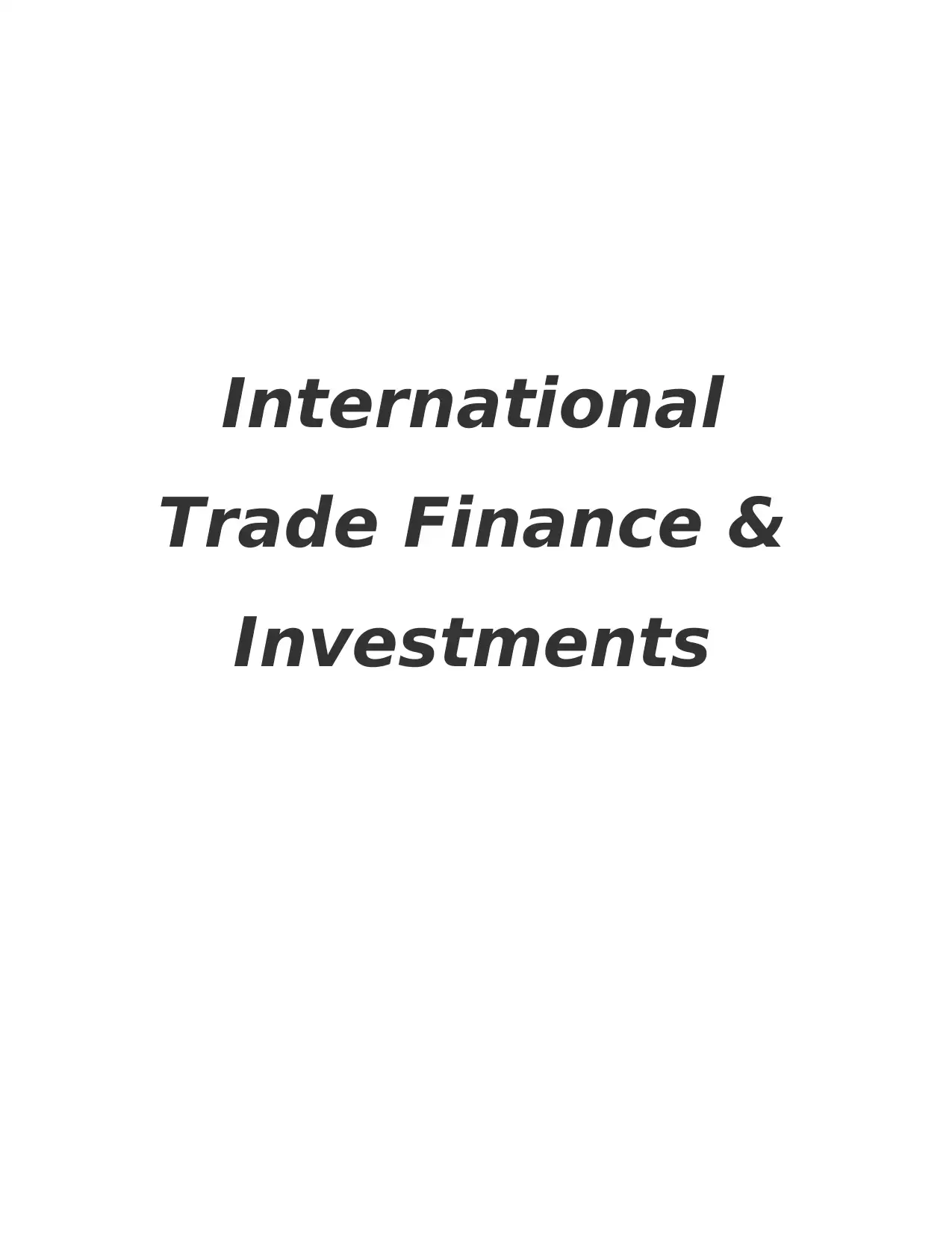
International
Trade Finance &
Investments
Trade Finance &
Investments
Secure Best Marks with AI Grader
Need help grading? Try our AI Grader for instant feedback on your assignments.
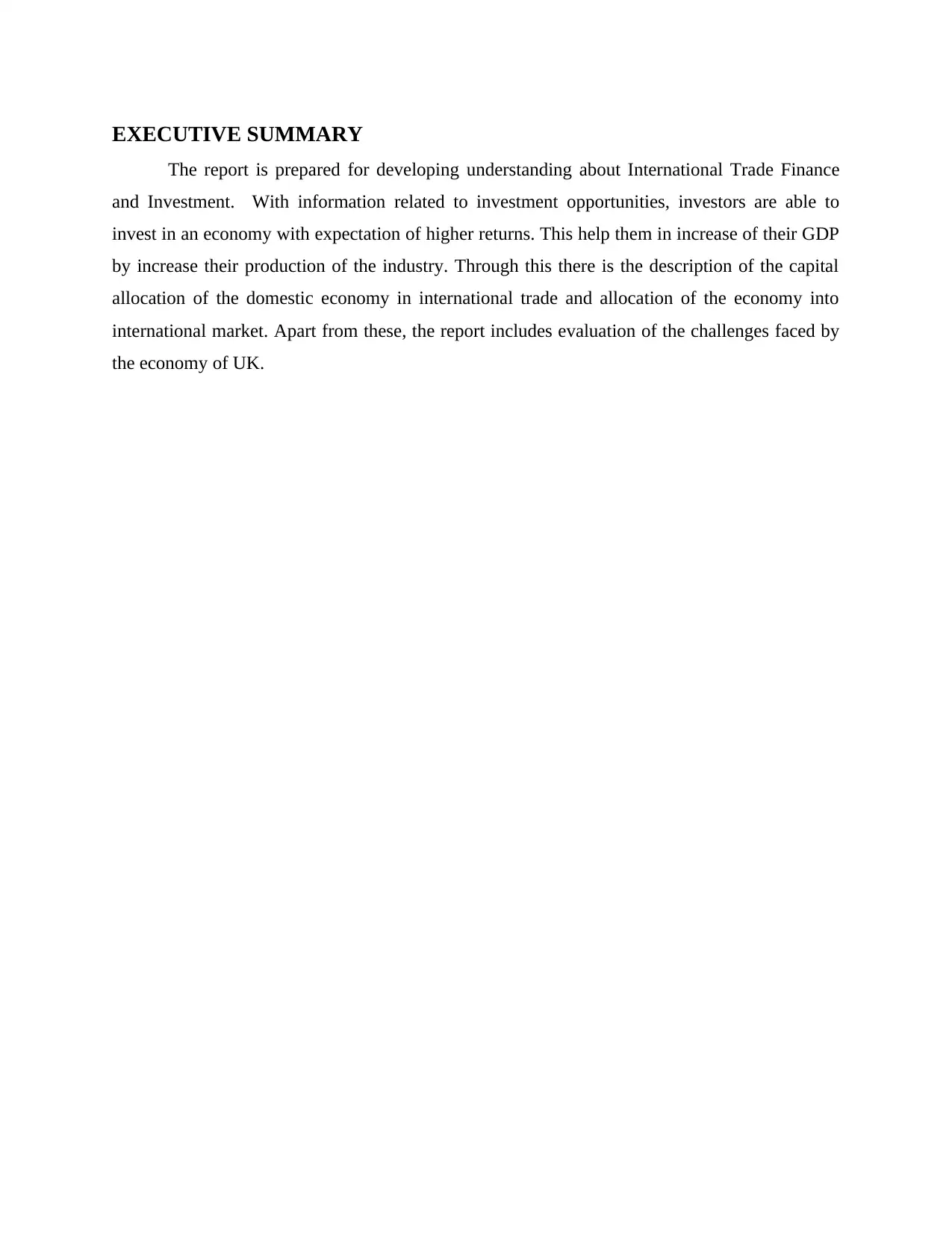
EXECUTIVE SUMMARY
The report is prepared for developing understanding about International Trade Finance
and Investment. With information related to investment opportunities, investors are able to
invest in an economy with expectation of higher returns. This help them in increase of their GDP
by increase their production of the industry. Through this there is the description of the capital
allocation of the domestic economy in international trade and allocation of the economy into
international market. Apart from these, the report includes evaluation of the challenges faced by
the economy of UK.
The report is prepared for developing understanding about International Trade Finance
and Investment. With information related to investment opportunities, investors are able to
invest in an economy with expectation of higher returns. This help them in increase of their GDP
by increase their production of the industry. Through this there is the description of the capital
allocation of the domestic economy in international trade and allocation of the economy into
international market. Apart from these, the report includes evaluation of the challenges faced by
the economy of UK.
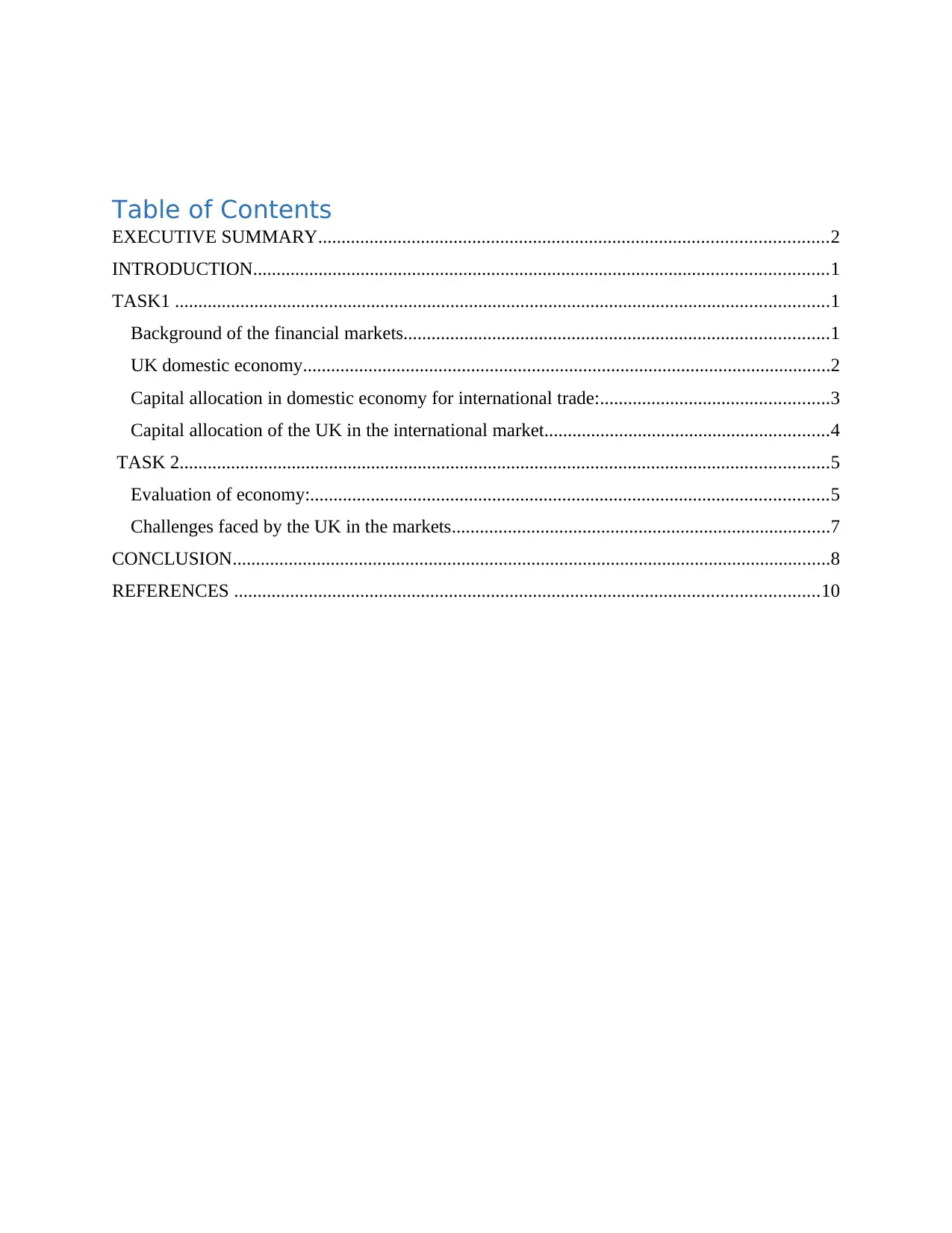
Table of Contents
EXECUTIVE SUMMARY.............................................................................................................2
INTRODUCTION...........................................................................................................................1
TASK1 ............................................................................................................................................1
Background of the financial markets...........................................................................................1
UK domestic economy.................................................................................................................2
Capital allocation in domestic economy for international trade:.................................................3
Capital allocation of the UK in the international market.............................................................4
TASK 2...........................................................................................................................................5
Evaluation of economy:...............................................................................................................5
Challenges faced by the UK in the markets.................................................................................7
CONCLUSION................................................................................................................................8
REFERENCES .............................................................................................................................10
EXECUTIVE SUMMARY.............................................................................................................2
INTRODUCTION...........................................................................................................................1
TASK1 ............................................................................................................................................1
Background of the financial markets...........................................................................................1
UK domestic economy.................................................................................................................2
Capital allocation in domestic economy for international trade:.................................................3
Capital allocation of the UK in the international market.............................................................4
TASK 2...........................................................................................................................................5
Evaluation of economy:...............................................................................................................5
Challenges faced by the UK in the markets.................................................................................7
CONCLUSION................................................................................................................................8
REFERENCES .............................................................................................................................10
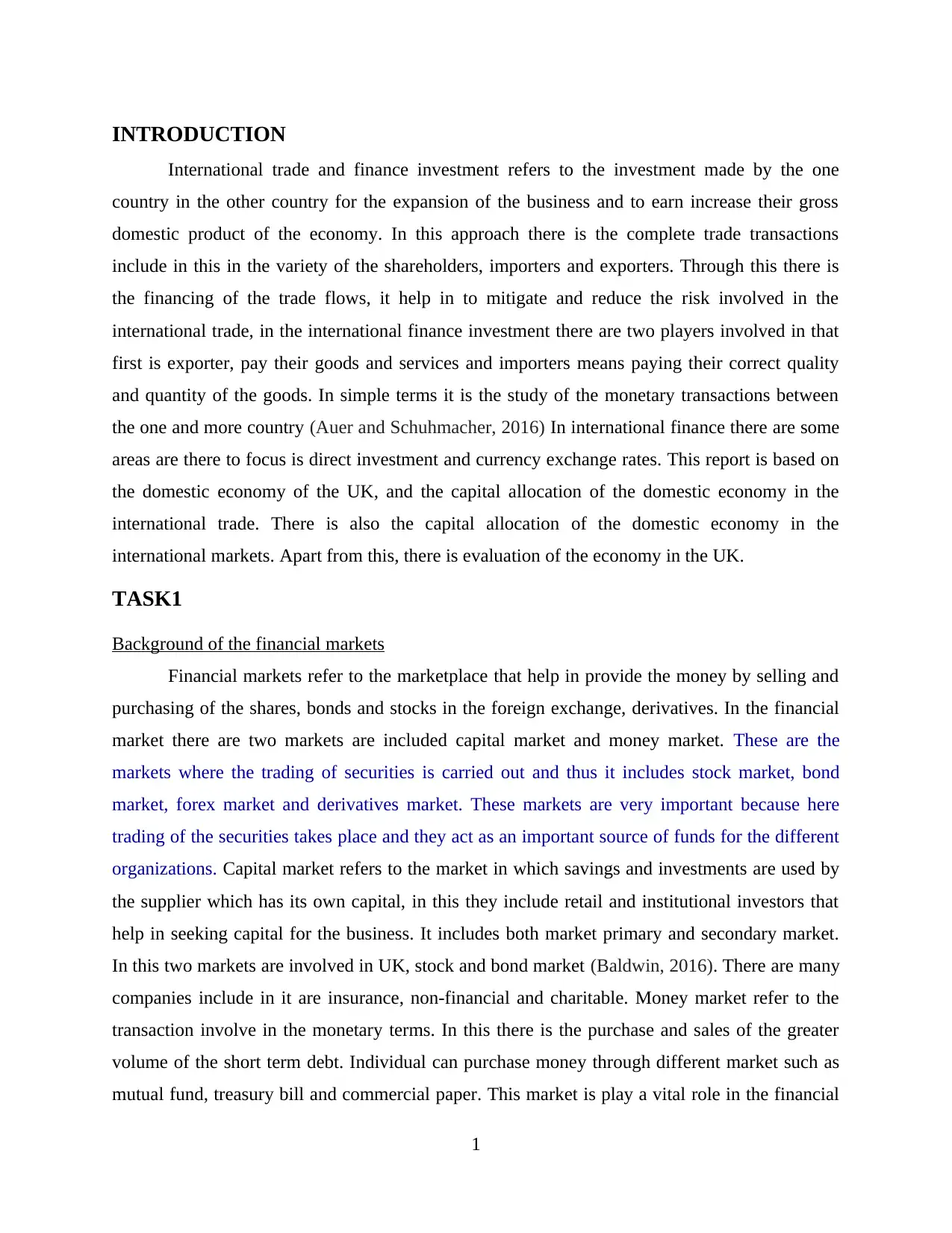
INTRODUCTION
International trade and finance investment refers to the investment made by the one
country in the other country for the expansion of the business and to earn increase their gross
domestic product of the economy. In this approach there is the complete trade transactions
include in this in the variety of the shareholders, importers and exporters. Through this there is
the financing of the trade flows, it help in to mitigate and reduce the risk involved in the
international trade, in the international finance investment there are two players involved in that
first is exporter, pay their goods and services and importers means paying their correct quality
and quantity of the goods. In simple terms it is the study of the monetary transactions between
the one and more country (Auer and Schuhmacher, 2016) In international finance there are some
areas are there to focus is direct investment and currency exchange rates. This report is based on
the domestic economy of the UK, and the capital allocation of the domestic economy in the
international trade. There is also the capital allocation of the domestic economy in the
international markets. Apart from this, there is evaluation of the economy in the UK.
TASK1
Background of the financial markets
Financial markets refer to the marketplace that help in provide the money by selling and
purchasing of the shares, bonds and stocks in the foreign exchange, derivatives. In the financial
market there are two markets are included capital market and money market. These are the
markets where the trading of securities is carried out and thus it includes stock market, bond
market, forex market and derivatives market. These markets are very important because here
trading of the securities takes place and they act as an important source of funds for the different
organizations. Capital market refers to the market in which savings and investments are used by
the supplier which has its own capital, in this they include retail and institutional investors that
help in seeking capital for the business. It includes both market primary and secondary market.
In this two markets are involved in UK, stock and bond market (Baldwin, 2016). There are many
companies include in it are insurance, non-financial and charitable. Money market refer to the
transaction involve in the monetary terms. In this there is the purchase and sales of the greater
volume of the short term debt. Individual can purchase money through different market such as
mutual fund, treasury bill and commercial paper. This market is play a vital role in the financial
1
International trade and finance investment refers to the investment made by the one
country in the other country for the expansion of the business and to earn increase their gross
domestic product of the economy. In this approach there is the complete trade transactions
include in this in the variety of the shareholders, importers and exporters. Through this there is
the financing of the trade flows, it help in to mitigate and reduce the risk involved in the
international trade, in the international finance investment there are two players involved in that
first is exporter, pay their goods and services and importers means paying their correct quality
and quantity of the goods. In simple terms it is the study of the monetary transactions between
the one and more country (Auer and Schuhmacher, 2016) In international finance there are some
areas are there to focus is direct investment and currency exchange rates. This report is based on
the domestic economy of the UK, and the capital allocation of the domestic economy in the
international trade. There is also the capital allocation of the domestic economy in the
international markets. Apart from this, there is evaluation of the economy in the UK.
TASK1
Background of the financial markets
Financial markets refer to the marketplace that help in provide the money by selling and
purchasing of the shares, bonds and stocks in the foreign exchange, derivatives. In the financial
market there are two markets are included capital market and money market. These are the
markets where the trading of securities is carried out and thus it includes stock market, bond
market, forex market and derivatives market. These markets are very important because here
trading of the securities takes place and they act as an important source of funds for the different
organizations. Capital market refers to the market in which savings and investments are used by
the supplier which has its own capital, in this they include retail and institutional investors that
help in seeking capital for the business. It includes both market primary and secondary market.
In this two markets are involved in UK, stock and bond market (Baldwin, 2016). There are many
companies include in it are insurance, non-financial and charitable. Money market refer to the
transaction involve in the monetary terms. In this there is the purchase and sales of the greater
volume of the short term debt. Individual can purchase money through different market such as
mutual fund, treasury bill and commercial paper. This market is play a vital role in the financial
1
Secure Best Marks with AI Grader
Need help grading? Try our AI Grader for instant feedback on your assignments.
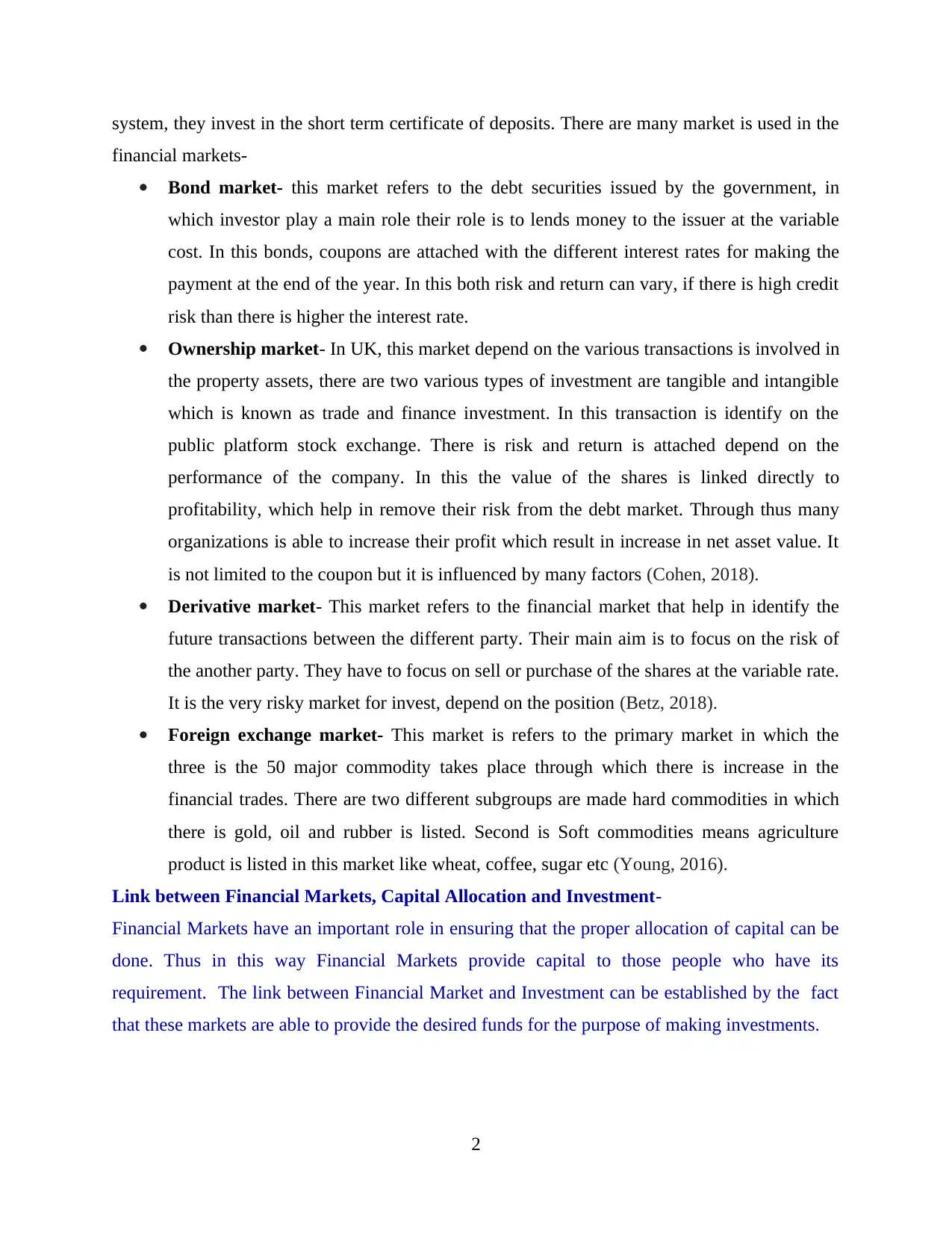
system, they invest in the short term certificate of deposits. There are many market is used in the
financial markets-
Bond market- this market refers to the debt securities issued by the government, in
which investor play a main role their role is to lends money to the issuer at the variable
cost. In this bonds, coupons are attached with the different interest rates for making the
payment at the end of the year. In this both risk and return can vary, if there is high credit
risk than there is higher the interest rate.
Ownership market- In UK, this market depend on the various transactions is involved in
the property assets, there are two various types of investment are tangible and intangible
which is known as trade and finance investment. In this transaction is identify on the
public platform stock exchange. There is risk and return is attached depend on the
performance of the company. In this the value of the shares is linked directly to
profitability, which help in remove their risk from the debt market. Through thus many
organizations is able to increase their profit which result in increase in net asset value. It
is not limited to the coupon but it is influenced by many factors (Cohen, 2018).
Derivative market- This market refers to the financial market that help in identify the
future transactions between the different party. Their main aim is to focus on the risk of
the another party. They have to focus on sell or purchase of the shares at the variable rate.
It is the very risky market for invest, depend on the position (Betz, 2018).
Foreign exchange market- This market is refers to the primary market in which the
three is the 50 major commodity takes place through which there is increase in the
financial trades. There are two different subgroups are made hard commodities in which
there is gold, oil and rubber is listed. Second is Soft commodities means agriculture
product is listed in this market like wheat, coffee, sugar etc (Young, 2016).
Link between Financial Markets, Capital Allocation and Investment-
Financial Markets have an important role in ensuring that the proper allocation of capital can be
done. Thus in this way Financial Markets provide capital to those people who have its
requirement. The link between Financial Market and Investment can be established by the fact
that these markets are able to provide the desired funds for the purpose of making investments.
2
financial markets-
Bond market- this market refers to the debt securities issued by the government, in
which investor play a main role their role is to lends money to the issuer at the variable
cost. In this bonds, coupons are attached with the different interest rates for making the
payment at the end of the year. In this both risk and return can vary, if there is high credit
risk than there is higher the interest rate.
Ownership market- In UK, this market depend on the various transactions is involved in
the property assets, there are two various types of investment are tangible and intangible
which is known as trade and finance investment. In this transaction is identify on the
public platform stock exchange. There is risk and return is attached depend on the
performance of the company. In this the value of the shares is linked directly to
profitability, which help in remove their risk from the debt market. Through thus many
organizations is able to increase their profit which result in increase in net asset value. It
is not limited to the coupon but it is influenced by many factors (Cohen, 2018).
Derivative market- This market refers to the financial market that help in identify the
future transactions between the different party. Their main aim is to focus on the risk of
the another party. They have to focus on sell or purchase of the shares at the variable rate.
It is the very risky market for invest, depend on the position (Betz, 2018).
Foreign exchange market- This market is refers to the primary market in which the
three is the 50 major commodity takes place through which there is increase in the
financial trades. There are two different subgroups are made hard commodities in which
there is gold, oil and rubber is listed. Second is Soft commodities means agriculture
product is listed in this market like wheat, coffee, sugar etc (Young, 2016).
Link between Financial Markets, Capital Allocation and Investment-
Financial Markets have an important role in ensuring that the proper allocation of capital can be
done. Thus in this way Financial Markets provide capital to those people who have its
requirement. The link between Financial Market and Investment can be established by the fact
that these markets are able to provide the desired funds for the purpose of making investments.
2
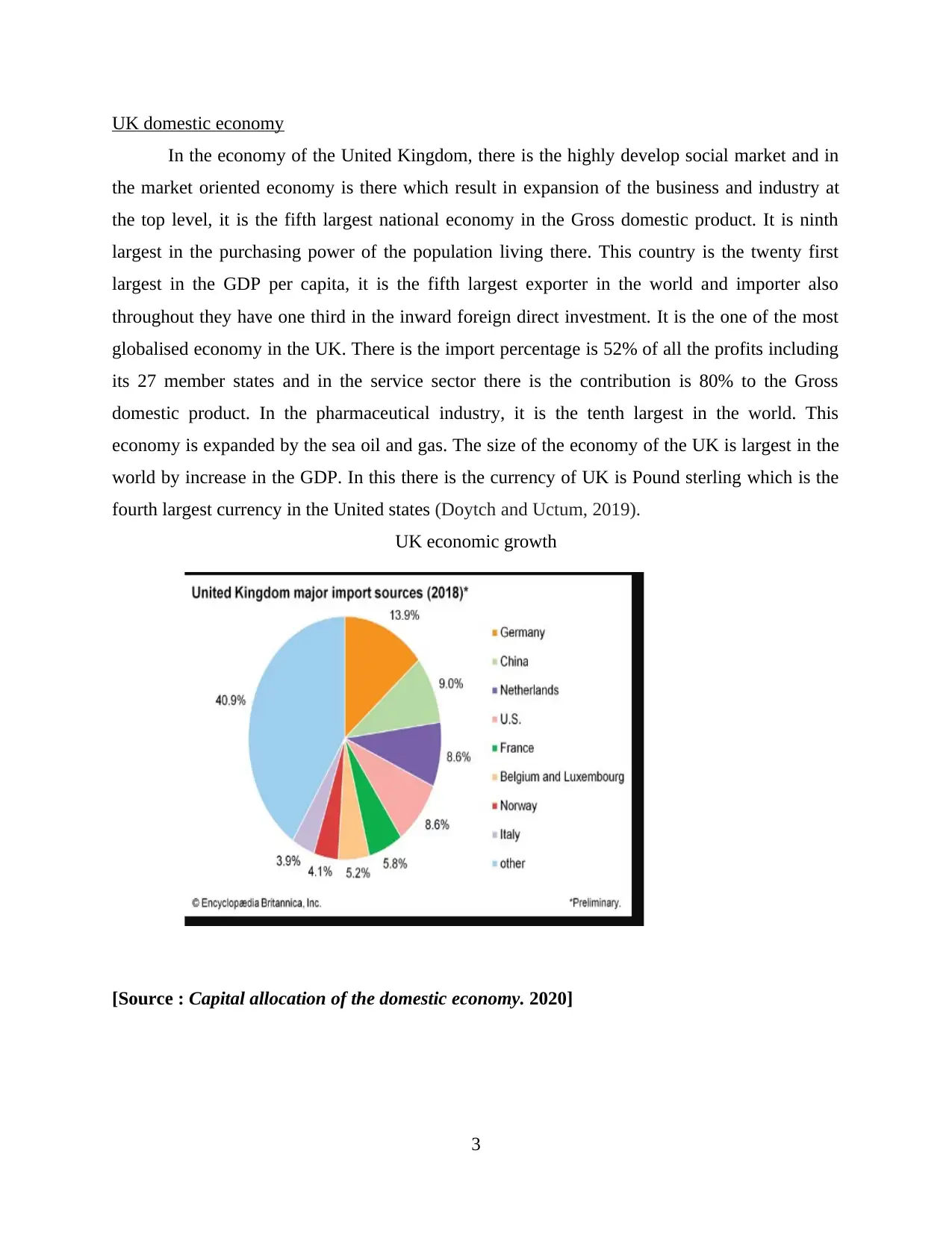
UK domestic economy
In the economy of the United Kingdom, there is the highly develop social market and in
the market oriented economy is there which result in expansion of the business and industry at
the top level, it is the fifth largest national economy in the Gross domestic product. It is ninth
largest in the purchasing power of the population living there. This country is the twenty first
largest in the GDP per capita, it is the fifth largest exporter in the world and importer also
throughout they have one third in the inward foreign direct investment. It is the one of the most
globalised economy in the UK. There is the import percentage is 52% of all the profits including
its 27 member states and in the service sector there is the contribution is 80% to the Gross
domestic product. In the pharmaceutical industry, it is the tenth largest in the world. This
economy is expanded by the sea oil and gas. The size of the economy of the UK is largest in the
world by increase in the GDP. In this there is the currency of UK is Pound sterling which is the
fourth largest currency in the United states (Doytch and Uctum, 2019).
UK economic growth
[Source : Capital allocation of the domestic economy. 2020]
3
In the economy of the United Kingdom, there is the highly develop social market and in
the market oriented economy is there which result in expansion of the business and industry at
the top level, it is the fifth largest national economy in the Gross domestic product. It is ninth
largest in the purchasing power of the population living there. This country is the twenty first
largest in the GDP per capita, it is the fifth largest exporter in the world and importer also
throughout they have one third in the inward foreign direct investment. It is the one of the most
globalised economy in the UK. There is the import percentage is 52% of all the profits including
its 27 member states and in the service sector there is the contribution is 80% to the Gross
domestic product. In the pharmaceutical industry, it is the tenth largest in the world. This
economy is expanded by the sea oil and gas. The size of the economy of the UK is largest in the
world by increase in the GDP. In this there is the currency of UK is Pound sterling which is the
fourth largest currency in the United states (Doytch and Uctum, 2019).
UK economic growth
[Source : Capital allocation of the domestic economy. 2020]
3
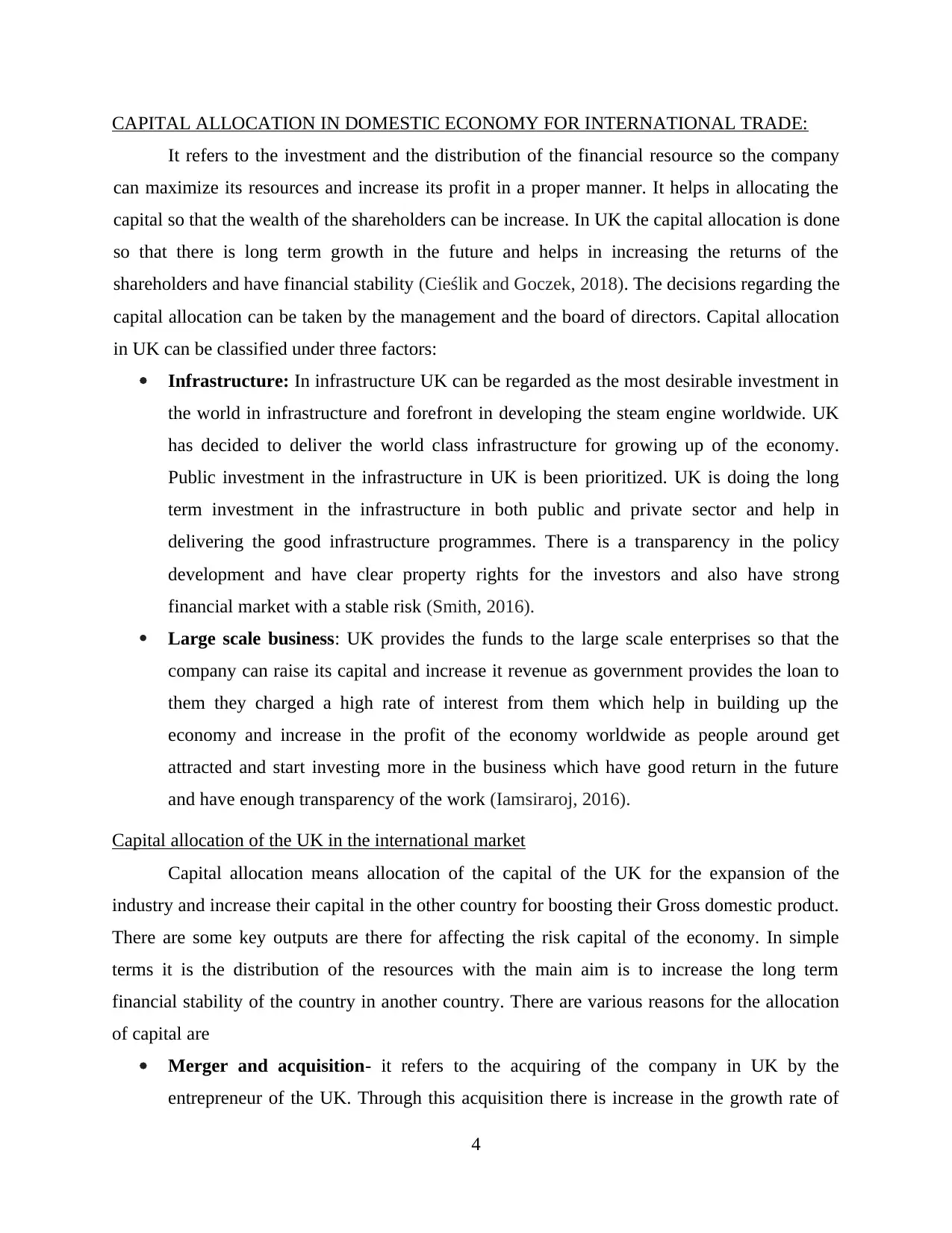
CAPITAL ALLOCATION IN DOMESTIC ECONOMY FOR INTERNATIONAL TRADE:
It refers to the investment and the distribution of the financial resource so the company
can maximize its resources and increase its profit in a proper manner. It helps in allocating the
capital so that the wealth of the shareholders can be increase. In UK the capital allocation is done
so that there is long term growth in the future and helps in increasing the returns of the
shareholders and have financial stability (Cieślik and Goczek, 2018). The decisions regarding the
capital allocation can be taken by the management and the board of directors. Capital allocation
in UK can be classified under three factors:
Infrastructure: In infrastructure UK can be regarded as the most desirable investment in
the world in infrastructure and forefront in developing the steam engine worldwide. UK
has decided to deliver the world class infrastructure for growing up of the economy.
Public investment in the infrastructure in UK is been prioritized. UK is doing the long
term investment in the infrastructure in both public and private sector and help in
delivering the good infrastructure programmes. There is a transparency in the policy
development and have clear property rights for the investors and also have strong
financial market with a stable risk (Smith, 2016).
Large scale business: UK provides the funds to the large scale enterprises so that the
company can raise its capital and increase it revenue as government provides the loan to
them they charged a high rate of interest from them which help in building up the
economy and increase in the profit of the economy worldwide as people around get
attracted and start investing more in the business which have good return in the future
and have enough transparency of the work (Iamsiraroj, 2016).
Capital allocation of the UK in the international market
Capital allocation means allocation of the capital of the UK for the expansion of the
industry and increase their capital in the other country for boosting their Gross domestic product.
There are some key outputs are there for affecting the risk capital of the economy. In simple
terms it is the distribution of the resources with the main aim is to increase the long term
financial stability of the country in another country. There are various reasons for the allocation
of capital are
Merger and acquisition- it refers to the acquiring of the company in UK by the
entrepreneur of the UK. Through this acquisition there is increase in the growth rate of
4
It refers to the investment and the distribution of the financial resource so the company
can maximize its resources and increase its profit in a proper manner. It helps in allocating the
capital so that the wealth of the shareholders can be increase. In UK the capital allocation is done
so that there is long term growth in the future and helps in increasing the returns of the
shareholders and have financial stability (Cieślik and Goczek, 2018). The decisions regarding the
capital allocation can be taken by the management and the board of directors. Capital allocation
in UK can be classified under three factors:
Infrastructure: In infrastructure UK can be regarded as the most desirable investment in
the world in infrastructure and forefront in developing the steam engine worldwide. UK
has decided to deliver the world class infrastructure for growing up of the economy.
Public investment in the infrastructure in UK is been prioritized. UK is doing the long
term investment in the infrastructure in both public and private sector and help in
delivering the good infrastructure programmes. There is a transparency in the policy
development and have clear property rights for the investors and also have strong
financial market with a stable risk (Smith, 2016).
Large scale business: UK provides the funds to the large scale enterprises so that the
company can raise its capital and increase it revenue as government provides the loan to
them they charged a high rate of interest from them which help in building up the
economy and increase in the profit of the economy worldwide as people around get
attracted and start investing more in the business which have good return in the future
and have enough transparency of the work (Iamsiraroj, 2016).
Capital allocation of the UK in the international market
Capital allocation means allocation of the capital of the UK for the expansion of the
industry and increase their capital in the other country for boosting their Gross domestic product.
There are some key outputs are there for affecting the risk capital of the economy. In simple
terms it is the distribution of the resources with the main aim is to increase the long term
financial stability of the country in another country. There are various reasons for the allocation
of capital are
Merger and acquisition- it refers to the acquiring of the company in UK by the
entrepreneur of the UK. Through this acquisition there is increase in the growth rate of
4
Paraphrase This Document
Need a fresh take? Get an instant paraphrase of this document with our AI Paraphraser
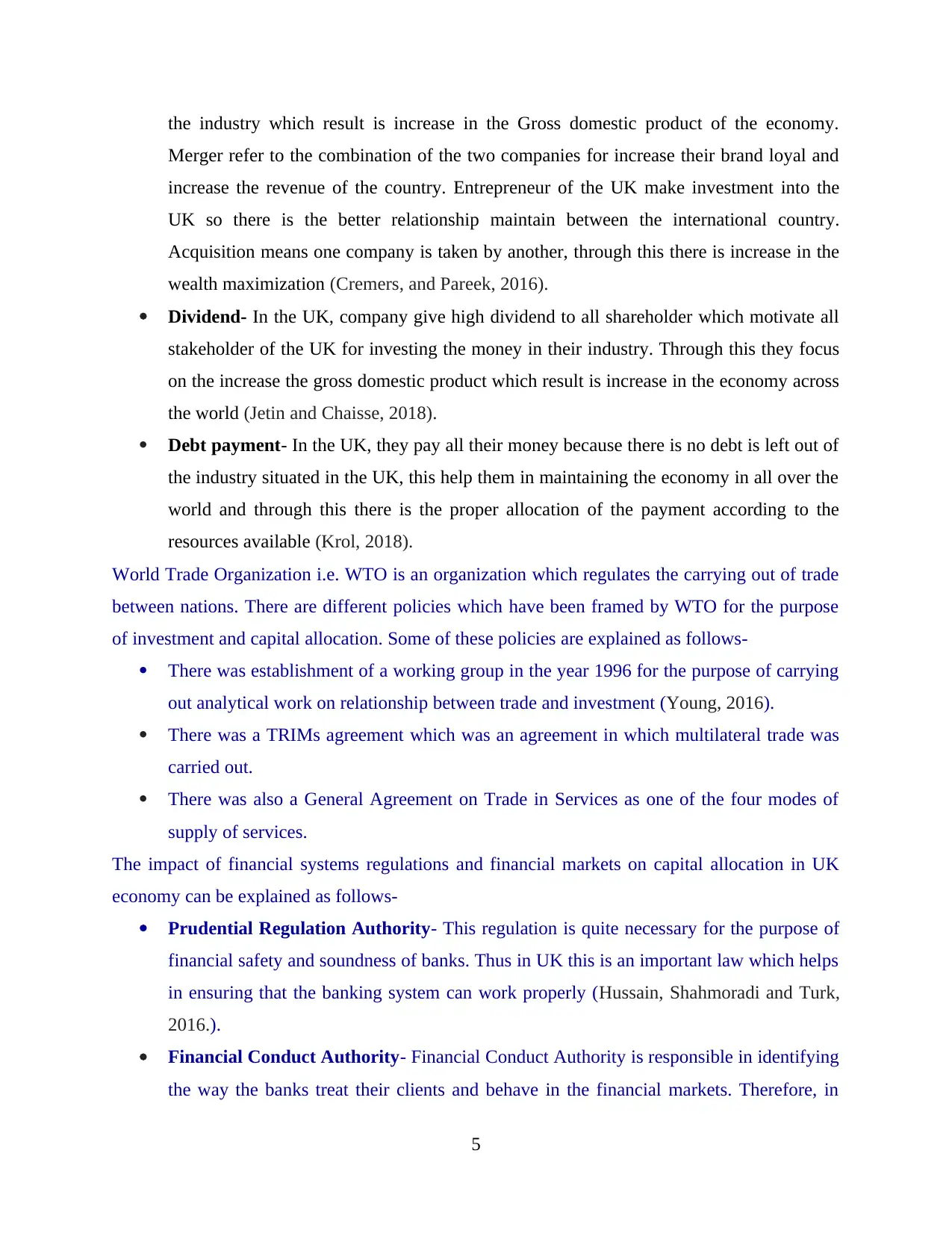
the industry which result is increase in the Gross domestic product of the economy.
Merger refer to the combination of the two companies for increase their brand loyal and
increase the revenue of the country. Entrepreneur of the UK make investment into the
UK so there is the better relationship maintain between the international country.
Acquisition means one company is taken by another, through this there is increase in the
wealth maximization (Cremers, and Pareek, 2016).
Dividend- In the UK, company give high dividend to all shareholder which motivate all
stakeholder of the UK for investing the money in their industry. Through this they focus
on the increase the gross domestic product which result is increase in the economy across
the world (Jetin and Chaisse, 2018).
Debt payment- In the UK, they pay all their money because there is no debt is left out of
the industry situated in the UK, this help them in maintaining the economy in all over the
world and through this there is the proper allocation of the payment according to the
resources available (Krol, 2018).
World Trade Organization i.e. WTO is an organization which regulates the carrying out of trade
between nations. There are different policies which have been framed by WTO for the purpose
of investment and capital allocation. Some of these policies are explained as follows-
There was establishment of a working group in the year 1996 for the purpose of carrying
out analytical work on relationship between trade and investment (Young, 2016).
There was a TRIMs agreement which was an agreement in which multilateral trade was
carried out.
There was also a General Agreement on Trade in Services as one of the four modes of
supply of services.
The impact of financial systems regulations and financial markets on capital allocation in UK
economy can be explained as follows-
Prudential Regulation Authority- This regulation is quite necessary for the purpose of
financial safety and soundness of banks. Thus in UK this is an important law which helps
in ensuring that the banking system can work properly (Hussain, Shahmoradi and Turk,
2016.).
Financial Conduct Authority- Financial Conduct Authority is responsible in identifying
the way the banks treat their clients and behave in the financial markets. Therefore, in
5
Merger refer to the combination of the two companies for increase their brand loyal and
increase the revenue of the country. Entrepreneur of the UK make investment into the
UK so there is the better relationship maintain between the international country.
Acquisition means one company is taken by another, through this there is increase in the
wealth maximization (Cremers, and Pareek, 2016).
Dividend- In the UK, company give high dividend to all shareholder which motivate all
stakeholder of the UK for investing the money in their industry. Through this they focus
on the increase the gross domestic product which result is increase in the economy across
the world (Jetin and Chaisse, 2018).
Debt payment- In the UK, they pay all their money because there is no debt is left out of
the industry situated in the UK, this help them in maintaining the economy in all over the
world and through this there is the proper allocation of the payment according to the
resources available (Krol, 2018).
World Trade Organization i.e. WTO is an organization which regulates the carrying out of trade
between nations. There are different policies which have been framed by WTO for the purpose
of investment and capital allocation. Some of these policies are explained as follows-
There was establishment of a working group in the year 1996 for the purpose of carrying
out analytical work on relationship between trade and investment (Young, 2016).
There was a TRIMs agreement which was an agreement in which multilateral trade was
carried out.
There was also a General Agreement on Trade in Services as one of the four modes of
supply of services.
The impact of financial systems regulations and financial markets on capital allocation in UK
economy can be explained as follows-
Prudential Regulation Authority- This regulation is quite necessary for the purpose of
financial safety and soundness of banks. Thus in UK this is an important law which helps
in ensuring that the banking system can work properly (Hussain, Shahmoradi and Turk,
2016.).
Financial Conduct Authority- Financial Conduct Authority is responsible in identifying
the way the banks treat their clients and behave in the financial markets. Therefore, in
5
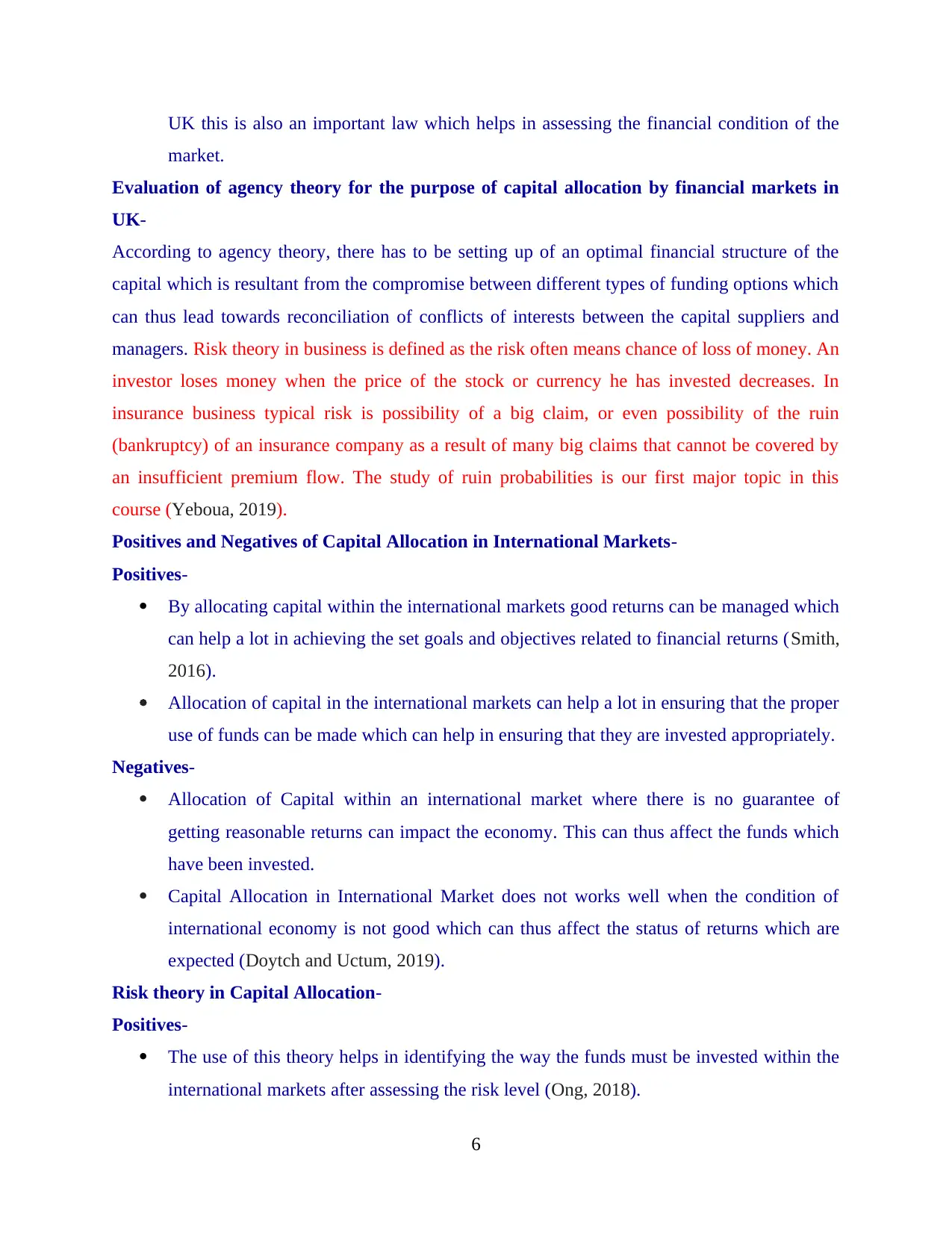
UK this is also an important law which helps in assessing the financial condition of the
market.
Evaluation of agency theory for the purpose of capital allocation by financial markets in
UK-
According to agency theory, there has to be setting up of an optimal financial structure of the
capital which is resultant from the compromise between different types of funding options which
can thus lead towards reconciliation of conflicts of interests between the capital suppliers and
managers. Risk theory in business is defined as the risk often means chance of loss of money. An
investor loses money when the price of the stock or currency he has invested decreases. In
insurance business typical risk is possibility of a big claim, or even possibility of the ruin
(bankruptcy) of an insurance company as a result of many big claims that cannot be covered by
an insufficient premium flow. The study of ruin probabilities is our first major topic in this
course (Yeboua, 2019).
Positives and Negatives of Capital Allocation in International Markets-
Positives-
By allocating capital within the international markets good returns can be managed which
can help a lot in achieving the set goals and objectives related to financial returns (Smith,
2016).
Allocation of capital in the international markets can help a lot in ensuring that the proper
use of funds can be made which can help in ensuring that they are invested appropriately.
Negatives-
Allocation of Capital within an international market where there is no guarantee of
getting reasonable returns can impact the economy. This can thus affect the funds which
have been invested.
Capital Allocation in International Market does not works well when the condition of
international economy is not good which can thus affect the status of returns which are
expected (Doytch and Uctum, 2019).
Risk theory in Capital Allocation-
Positives-
The use of this theory helps in identifying the way the funds must be invested within the
international markets after assessing the risk level (Ong, 2018).
6
market.
Evaluation of agency theory for the purpose of capital allocation by financial markets in
UK-
According to agency theory, there has to be setting up of an optimal financial structure of the
capital which is resultant from the compromise between different types of funding options which
can thus lead towards reconciliation of conflicts of interests between the capital suppliers and
managers. Risk theory in business is defined as the risk often means chance of loss of money. An
investor loses money when the price of the stock or currency he has invested decreases. In
insurance business typical risk is possibility of a big claim, or even possibility of the ruin
(bankruptcy) of an insurance company as a result of many big claims that cannot be covered by
an insufficient premium flow. The study of ruin probabilities is our first major topic in this
course (Yeboua, 2019).
Positives and Negatives of Capital Allocation in International Markets-
Positives-
By allocating capital within the international markets good returns can be managed which
can help a lot in achieving the set goals and objectives related to financial returns (Smith,
2016).
Allocation of capital in the international markets can help a lot in ensuring that the proper
use of funds can be made which can help in ensuring that they are invested appropriately.
Negatives-
Allocation of Capital within an international market where there is no guarantee of
getting reasonable returns can impact the economy. This can thus affect the funds which
have been invested.
Capital Allocation in International Market does not works well when the condition of
international economy is not good which can thus affect the status of returns which are
expected (Doytch and Uctum, 2019).
Risk theory in Capital Allocation-
Positives-
The use of this theory helps in identifying the way the funds must be invested within the
international markets after assessing the risk level (Ong, 2018).
6
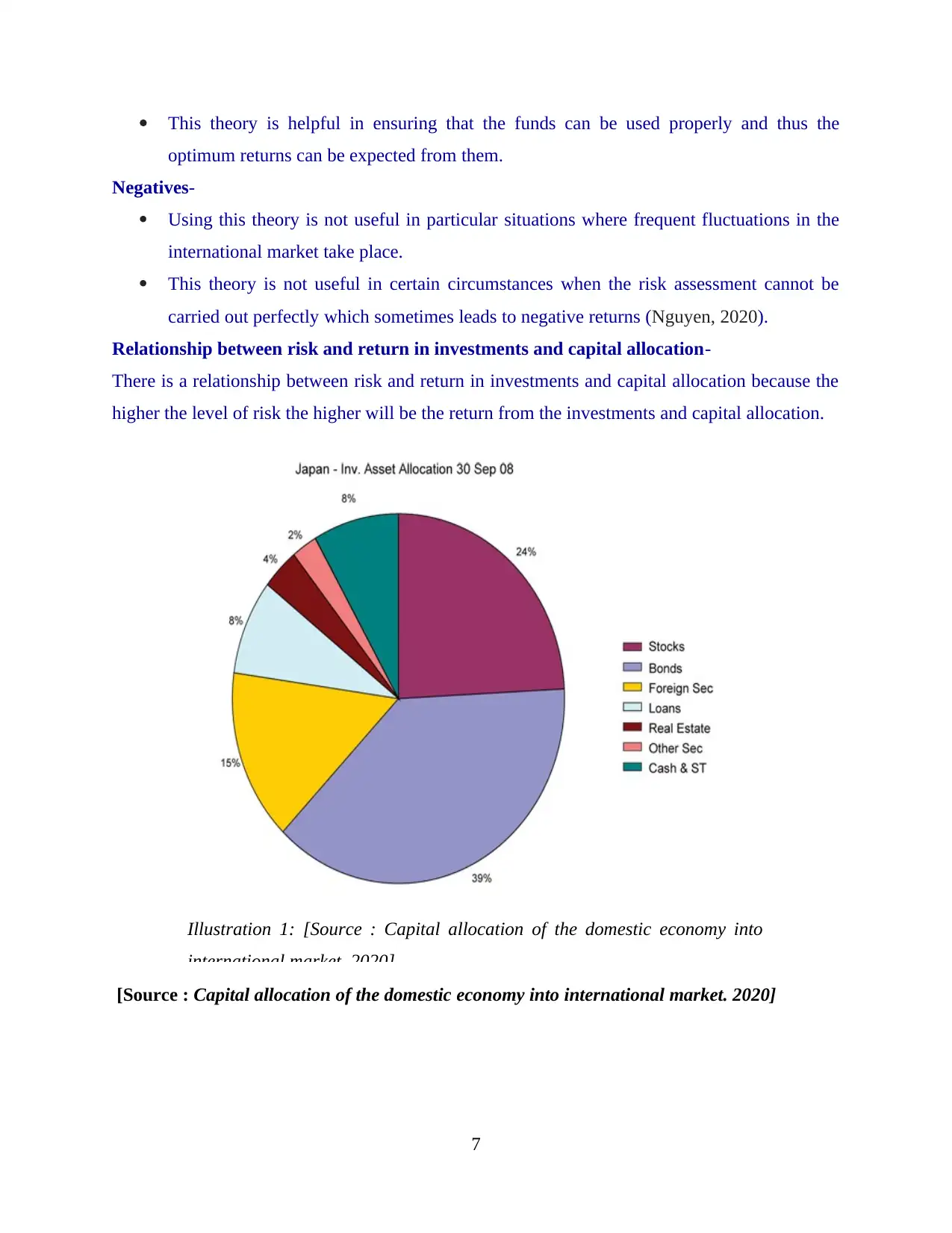
This theory is helpful in ensuring that the funds can be used properly and thus the
optimum returns can be expected from them.
Negatives-
Using this theory is not useful in particular situations where frequent fluctuations in the
international market take place.
This theory is not useful in certain circumstances when the risk assessment cannot be
carried out perfectly which sometimes leads to negative returns (Nguyen, 2020).
Relationship between risk and return in investments and capital allocation-
There is a relationship between risk and return in investments and capital allocation because the
higher the level of risk the higher will be the return from the investments and capital allocation.
[Source : Capital allocation of the domestic economy into international market. 2020]
7
Illustration 1: [Source : Capital allocation of the domestic economy into
international market. 2020].
optimum returns can be expected from them.
Negatives-
Using this theory is not useful in particular situations where frequent fluctuations in the
international market take place.
This theory is not useful in certain circumstances when the risk assessment cannot be
carried out perfectly which sometimes leads to negative returns (Nguyen, 2020).
Relationship between risk and return in investments and capital allocation-
There is a relationship between risk and return in investments and capital allocation because the
higher the level of risk the higher will be the return from the investments and capital allocation.
[Source : Capital allocation of the domestic economy into international market. 2020]
7
Illustration 1: [Source : Capital allocation of the domestic economy into
international market. 2020].
Secure Best Marks with AI Grader
Need help grading? Try our AI Grader for instant feedback on your assignments.
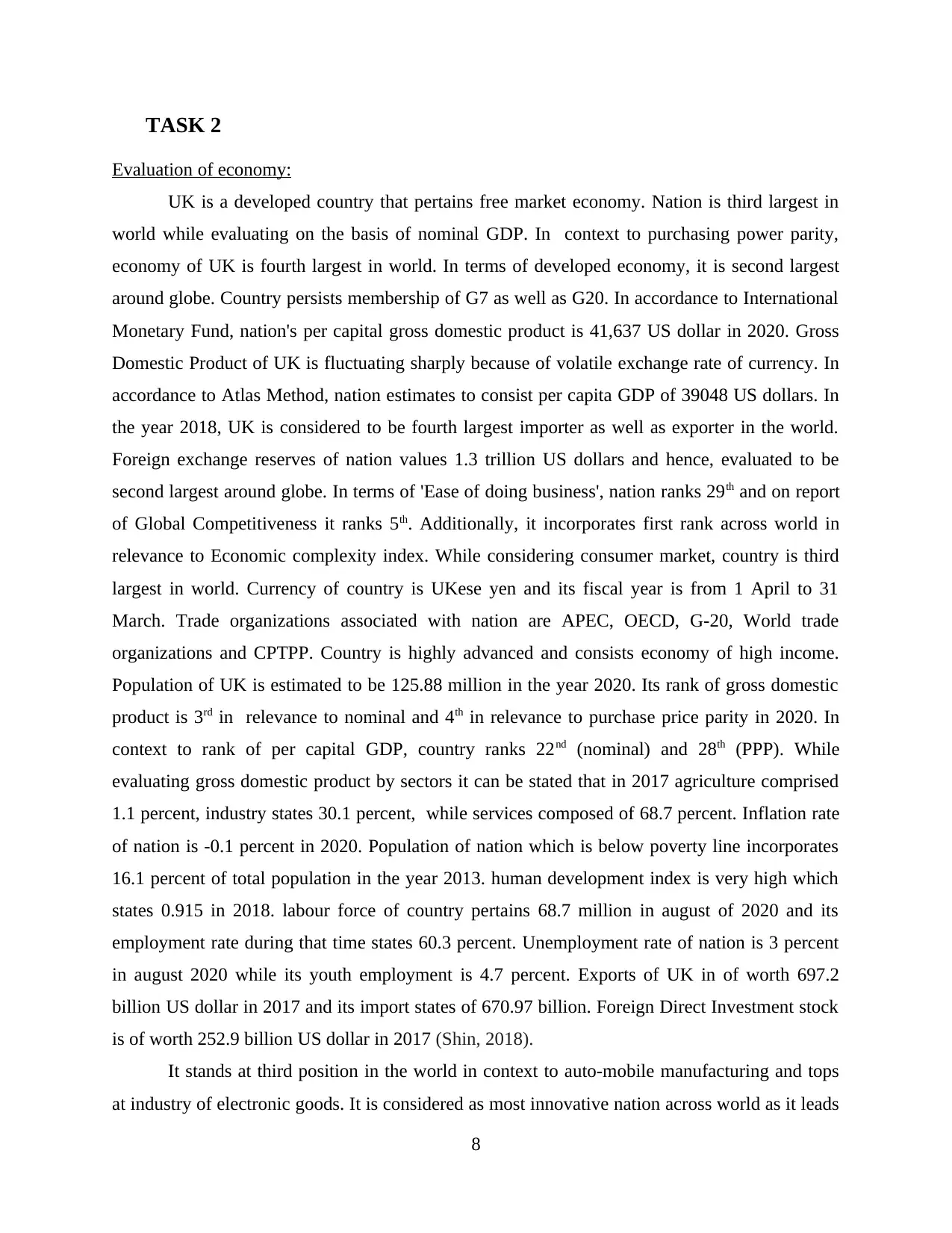
TASK 2
Evaluation of economy:
UK is a developed country that pertains free market economy. Nation is third largest in
world while evaluating on the basis of nominal GDP. In context to purchasing power parity,
economy of UK is fourth largest in world. In terms of developed economy, it is second largest
around globe. Country persists membership of G7 as well as G20. In accordance to International
Monetary Fund, nation's per capital gross domestic product is 41,637 US dollar in 2020. Gross
Domestic Product of UK is fluctuating sharply because of volatile exchange rate of currency. In
accordance to Atlas Method, nation estimates to consist per capita GDP of 39048 US dollars. In
the year 2018, UK is considered to be fourth largest importer as well as exporter in the world.
Foreign exchange reserves of nation values 1.3 trillion US dollars and hence, evaluated to be
second largest around globe. In terms of 'Ease of doing business', nation ranks 29th and on report
of Global Competitiveness it ranks 5th. Additionally, it incorporates first rank across world in
relevance to Economic complexity index. While considering consumer market, country is third
largest in world. Currency of country is UKese yen and its fiscal year is from 1 April to 31
March. Trade organizations associated with nation are APEC, OECD, G-20, World trade
organizations and CPTPP. Country is highly advanced and consists economy of high income.
Population of UK is estimated to be 125.88 million in the year 2020. Its rank of gross domestic
product is 3rd in relevance to nominal and 4th in relevance to purchase price parity in 2020. In
context to rank of per capital GDP, country ranks 22nd (nominal) and 28th (PPP). While
evaluating gross domestic product by sectors it can be stated that in 2017 agriculture comprised
1.1 percent, industry states 30.1 percent, while services composed of 68.7 percent. Inflation rate
of nation is -0.1 percent in 2020. Population of nation which is below poverty line incorporates
16.1 percent of total population in the year 2013. human development index is very high which
states 0.915 in 2018. labour force of country pertains 68.7 million in august of 2020 and its
employment rate during that time states 60.3 percent. Unemployment rate of nation is 3 percent
in august 2020 while its youth employment is 4.7 percent. Exports of UK in of worth 697.2
billion US dollar in 2017 and its import states of 670.97 billion. Foreign Direct Investment stock
is of worth 252.9 billion US dollar in 2017 (Shin, 2018).
It stands at third position in the world in context to auto-mobile manufacturing and tops
at industry of electronic goods. It is considered as most innovative nation across world as it leads
8
Evaluation of economy:
UK is a developed country that pertains free market economy. Nation is third largest in
world while evaluating on the basis of nominal GDP. In context to purchasing power parity,
economy of UK is fourth largest in world. In terms of developed economy, it is second largest
around globe. Country persists membership of G7 as well as G20. In accordance to International
Monetary Fund, nation's per capital gross domestic product is 41,637 US dollar in 2020. Gross
Domestic Product of UK is fluctuating sharply because of volatile exchange rate of currency. In
accordance to Atlas Method, nation estimates to consist per capita GDP of 39048 US dollars. In
the year 2018, UK is considered to be fourth largest importer as well as exporter in the world.
Foreign exchange reserves of nation values 1.3 trillion US dollars and hence, evaluated to be
second largest around globe. In terms of 'Ease of doing business', nation ranks 29th and on report
of Global Competitiveness it ranks 5th. Additionally, it incorporates first rank across world in
relevance to Economic complexity index. While considering consumer market, country is third
largest in world. Currency of country is UKese yen and its fiscal year is from 1 April to 31
March. Trade organizations associated with nation are APEC, OECD, G-20, World trade
organizations and CPTPP. Country is highly advanced and consists economy of high income.
Population of UK is estimated to be 125.88 million in the year 2020. Its rank of gross domestic
product is 3rd in relevance to nominal and 4th in relevance to purchase price parity in 2020. In
context to rank of per capital GDP, country ranks 22nd (nominal) and 28th (PPP). While
evaluating gross domestic product by sectors it can be stated that in 2017 agriculture comprised
1.1 percent, industry states 30.1 percent, while services composed of 68.7 percent. Inflation rate
of nation is -0.1 percent in 2020. Population of nation which is below poverty line incorporates
16.1 percent of total population in the year 2013. human development index is very high which
states 0.915 in 2018. labour force of country pertains 68.7 million in august of 2020 and its
employment rate during that time states 60.3 percent. Unemployment rate of nation is 3 percent
in august 2020 while its youth employment is 4.7 percent. Exports of UK in of worth 697.2
billion US dollar in 2017 and its import states of 670.97 billion. Foreign Direct Investment stock
is of worth 252.9 billion US dollar in 2017 (Shin, 2018).
It stands at third position in the world in context to auto-mobile manufacturing and tops
at industry of electronic goods. It is considered as most innovative nation across world as it leads
8
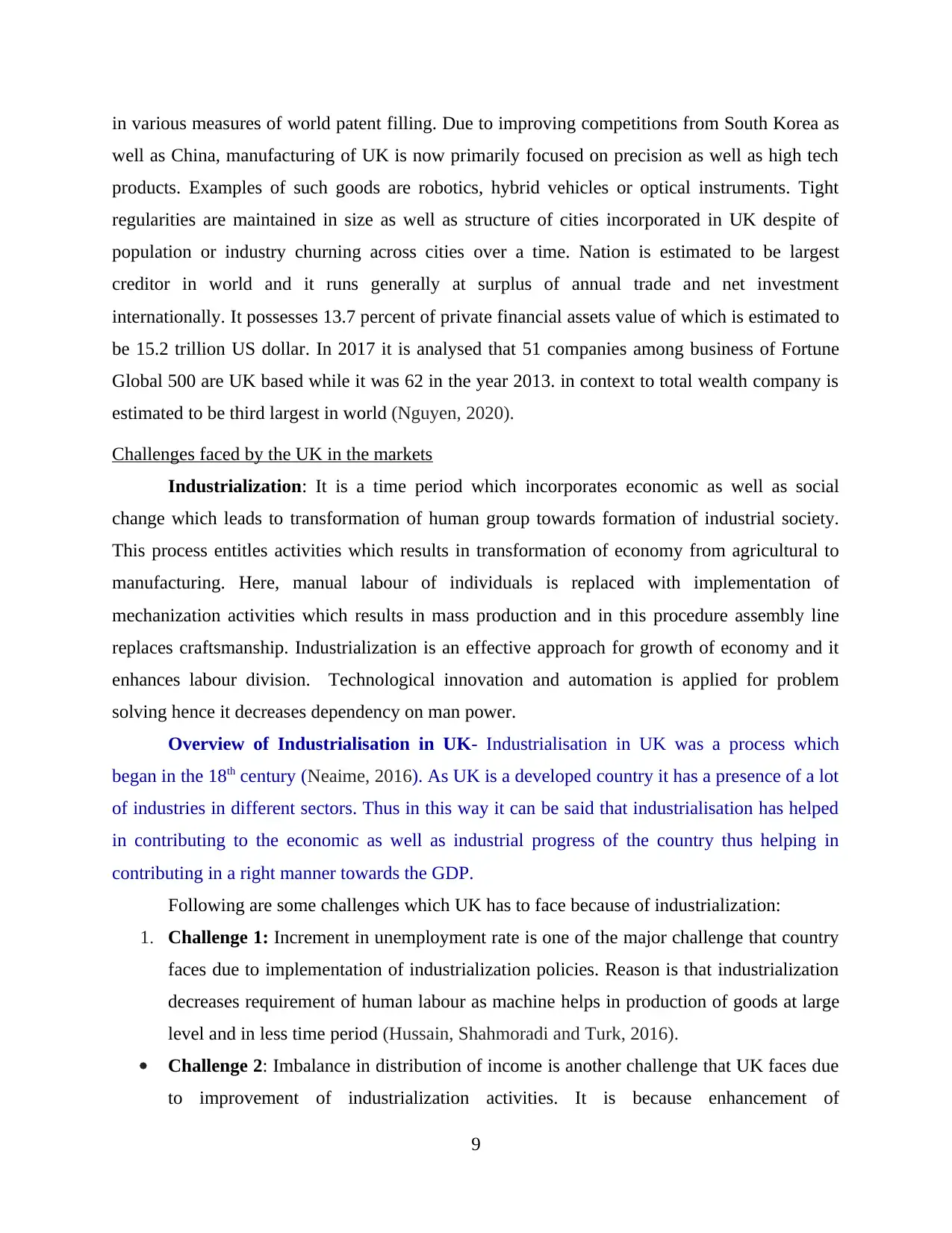
in various measures of world patent filling. Due to improving competitions from South Korea as
well as China, manufacturing of UK is now primarily focused on precision as well as high tech
products. Examples of such goods are robotics, hybrid vehicles or optical instruments. Tight
regularities are maintained in size as well as structure of cities incorporated in UK despite of
population or industry churning across cities over a time. Nation is estimated to be largest
creditor in world and it runs generally at surplus of annual trade and net investment
internationally. It possesses 13.7 percent of private financial assets value of which is estimated to
be 15.2 trillion US dollar. In 2017 it is analysed that 51 companies among business of Fortune
Global 500 are UK based while it was 62 in the year 2013. in context to total wealth company is
estimated to be third largest in world (Nguyen, 2020).
Challenges faced by the UK in the markets
Industrialization: It is a time period which incorporates economic as well as social
change which leads to transformation of human group towards formation of industrial society.
This process entitles activities which results in transformation of economy from agricultural to
manufacturing. Here, manual labour of individuals is replaced with implementation of
mechanization activities which results in mass production and in this procedure assembly line
replaces craftsmanship. Industrialization is an effective approach for growth of economy and it
enhances labour division. Technological innovation and automation is applied for problem
solving hence it decreases dependency on man power.
Overview of Industrialisation in UK- Industrialisation in UK was a process which
began in the 18th century (Neaime, 2016). As UK is a developed country it has a presence of a lot
of industries in different sectors. Thus in this way it can be said that industrialisation has helped
in contributing to the economic as well as industrial progress of the country thus helping in
contributing in a right manner towards the GDP.
Following are some challenges which UK has to face because of industrialization:
1. Challenge 1: Increment in unemployment rate is one of the major challenge that country
faces due to implementation of industrialization policies. Reason is that industrialization
decreases requirement of human labour as machine helps in production of goods at large
level and in less time period (Hussain, Shahmoradi and Turk, 2016).
Challenge 2: Imbalance in distribution of income is another challenge that UK faces due
to improvement of industrialization activities. It is because enhancement of
9
well as China, manufacturing of UK is now primarily focused on precision as well as high tech
products. Examples of such goods are robotics, hybrid vehicles or optical instruments. Tight
regularities are maintained in size as well as structure of cities incorporated in UK despite of
population or industry churning across cities over a time. Nation is estimated to be largest
creditor in world and it runs generally at surplus of annual trade and net investment
internationally. It possesses 13.7 percent of private financial assets value of which is estimated to
be 15.2 trillion US dollar. In 2017 it is analysed that 51 companies among business of Fortune
Global 500 are UK based while it was 62 in the year 2013. in context to total wealth company is
estimated to be third largest in world (Nguyen, 2020).
Challenges faced by the UK in the markets
Industrialization: It is a time period which incorporates economic as well as social
change which leads to transformation of human group towards formation of industrial society.
This process entitles activities which results in transformation of economy from agricultural to
manufacturing. Here, manual labour of individuals is replaced with implementation of
mechanization activities which results in mass production and in this procedure assembly line
replaces craftsmanship. Industrialization is an effective approach for growth of economy and it
enhances labour division. Technological innovation and automation is applied for problem
solving hence it decreases dependency on man power.
Overview of Industrialisation in UK- Industrialisation in UK was a process which
began in the 18th century (Neaime, 2016). As UK is a developed country it has a presence of a lot
of industries in different sectors. Thus in this way it can be said that industrialisation has helped
in contributing to the economic as well as industrial progress of the country thus helping in
contributing in a right manner towards the GDP.
Following are some challenges which UK has to face because of industrialization:
1. Challenge 1: Increment in unemployment rate is one of the major challenge that country
faces due to implementation of industrialization policies. Reason is that industrialization
decreases requirement of human labour as machine helps in production of goods at large
level and in less time period (Hussain, Shahmoradi and Turk, 2016).
Challenge 2: Imbalance in distribution of income is another challenge that UK faces due
to improvement of industrialization activities. It is because enhancement of
9
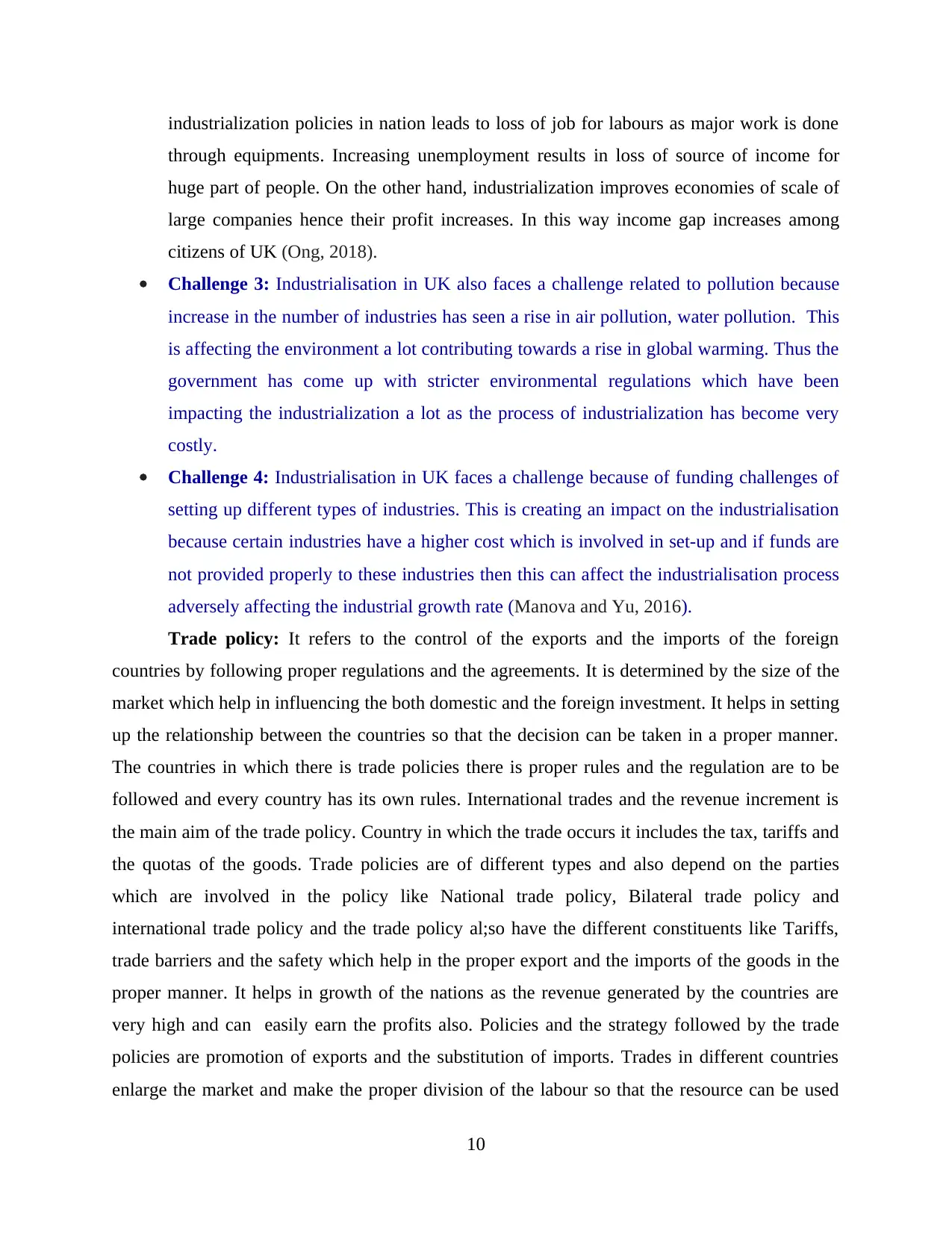
industrialization policies in nation leads to loss of job for labours as major work is done
through equipments. Increasing unemployment results in loss of source of income for
huge part of people. On the other hand, industrialization improves economies of scale of
large companies hence their profit increases. In this way income gap increases among
citizens of UK (Ong, 2018).
Challenge 3: Industrialisation in UK also faces a challenge related to pollution because
increase in the number of industries has seen a rise in air pollution, water pollution. This
is affecting the environment a lot contributing towards a rise in global warming. Thus the
government has come up with stricter environmental regulations which have been
impacting the industrialization a lot as the process of industrialization has become very
costly.
Challenge 4: Industrialisation in UK faces a challenge because of funding challenges of
setting up different types of industries. This is creating an impact on the industrialisation
because certain industries have a higher cost which is involved in set-up and if funds are
not provided properly to these industries then this can affect the industrialisation process
adversely affecting the industrial growth rate (Manova and Yu, 2016).
Trade policy: It refers to the control of the exports and the imports of the foreign
countries by following proper regulations and the agreements. It is determined by the size of the
market which help in influencing the both domestic and the foreign investment. It helps in setting
up the relationship between the countries so that the decision can be taken in a proper manner.
The countries in which there is trade policies there is proper rules and the regulation are to be
followed and every country has its own rules. International trades and the revenue increment is
the main aim of the trade policy. Country in which the trade occurs it includes the tax, tariffs and
the quotas of the goods. Trade policies are of different types and also depend on the parties
which are involved in the policy like National trade policy, Bilateral trade policy and
international trade policy and the trade policy al;so have the different constituents like Tariffs,
trade barriers and the safety which help in the proper export and the imports of the goods in the
proper manner. It helps in growth of the nations as the revenue generated by the countries are
very high and can easily earn the profits also. Policies and the strategy followed by the trade
policies are promotion of exports and the substitution of imports. Trades in different countries
enlarge the market and make the proper division of the labour so that the resource can be used
10
through equipments. Increasing unemployment results in loss of source of income for
huge part of people. On the other hand, industrialization improves economies of scale of
large companies hence their profit increases. In this way income gap increases among
citizens of UK (Ong, 2018).
Challenge 3: Industrialisation in UK also faces a challenge related to pollution because
increase in the number of industries has seen a rise in air pollution, water pollution. This
is affecting the environment a lot contributing towards a rise in global warming. Thus the
government has come up with stricter environmental regulations which have been
impacting the industrialization a lot as the process of industrialization has become very
costly.
Challenge 4: Industrialisation in UK faces a challenge because of funding challenges of
setting up different types of industries. This is creating an impact on the industrialisation
because certain industries have a higher cost which is involved in set-up and if funds are
not provided properly to these industries then this can affect the industrialisation process
adversely affecting the industrial growth rate (Manova and Yu, 2016).
Trade policy: It refers to the control of the exports and the imports of the foreign
countries by following proper regulations and the agreements. It is determined by the size of the
market which help in influencing the both domestic and the foreign investment. It helps in setting
up the relationship between the countries so that the decision can be taken in a proper manner.
The countries in which there is trade policies there is proper rules and the regulation are to be
followed and every country has its own rules. International trades and the revenue increment is
the main aim of the trade policy. Country in which the trade occurs it includes the tax, tariffs and
the quotas of the goods. Trade policies are of different types and also depend on the parties
which are involved in the policy like National trade policy, Bilateral trade policy and
international trade policy and the trade policy al;so have the different constituents like Tariffs,
trade barriers and the safety which help in the proper export and the imports of the goods in the
proper manner. It helps in growth of the nations as the revenue generated by the countries are
very high and can easily earn the profits also. Policies and the strategy followed by the trade
policies are promotion of exports and the substitution of imports. Trades in different countries
enlarge the market and make the proper division of the labour so that the resource can be used
10
Paraphrase This Document
Need a fresh take? Get an instant paraphrase of this document with our AI Paraphraser
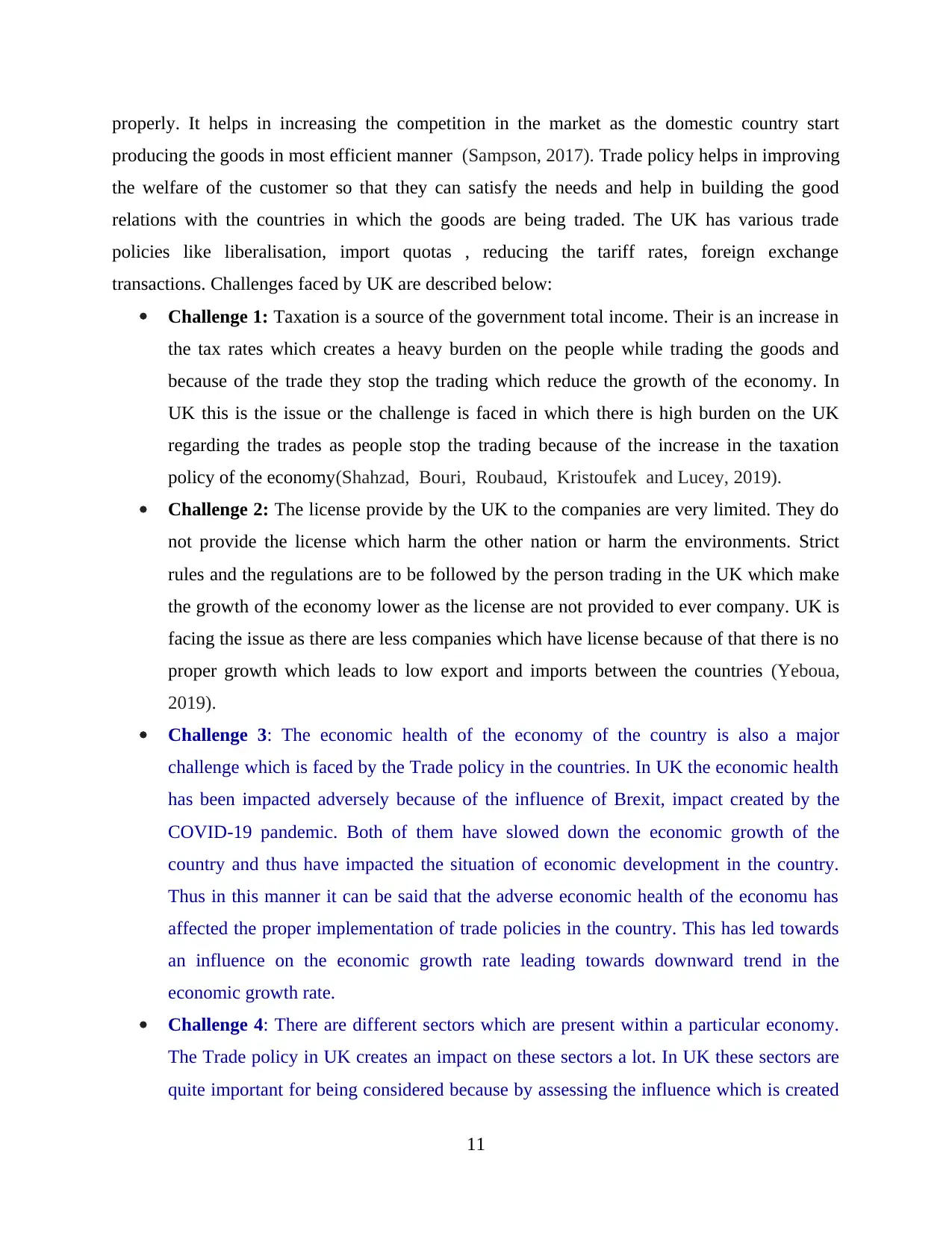
properly. It helps in increasing the competition in the market as the domestic country start
producing the goods in most efficient manner (Sampson, 2017). Trade policy helps in improving
the welfare of the customer so that they can satisfy the needs and help in building the good
relations with the countries in which the goods are being traded. The UK has various trade
policies like liberalisation, import quotas , reducing the tariff rates, foreign exchange
transactions. Challenges faced by UK are described below:
Challenge 1: Taxation is a source of the government total income. Their is an increase in
the tax rates which creates a heavy burden on the people while trading the goods and
because of the trade they stop the trading which reduce the growth of the economy. In
UK this is the issue or the challenge is faced in which there is high burden on the UK
regarding the trades as people stop the trading because of the increase in the taxation
policy of the economy(Shahzad, Bouri, Roubaud, Kristoufek and Lucey, 2019).
Challenge 2: The license provide by the UK to the companies are very limited. They do
not provide the license which harm the other nation or harm the environments. Strict
rules and the regulations are to be followed by the person trading in the UK which make
the growth of the economy lower as the license are not provided to ever company. UK is
facing the issue as there are less companies which have license because of that there is no
proper growth which leads to low export and imports between the countries (Yeboua,
2019).
Challenge 3: The economic health of the economy of the country is also a major
challenge which is faced by the Trade policy in the countries. In UK the economic health
has been impacted adversely because of the influence of Brexit, impact created by the
COVID-19 pandemic. Both of them have slowed down the economic growth of the
country and thus have impacted the situation of economic development in the country.
Thus in this manner it can be said that the adverse economic health of the economu has
affected the proper implementation of trade policies in the country. This has led towards
an influence on the economic growth rate leading towards downward trend in the
economic growth rate.
Challenge 4: There are different sectors which are present within a particular economy.
The Trade policy in UK creates an impact on these sectors a lot. In UK these sectors are
quite important for being considered because by assessing the influence which is created
11
producing the goods in most efficient manner (Sampson, 2017). Trade policy helps in improving
the welfare of the customer so that they can satisfy the needs and help in building the good
relations with the countries in which the goods are being traded. The UK has various trade
policies like liberalisation, import quotas , reducing the tariff rates, foreign exchange
transactions. Challenges faced by UK are described below:
Challenge 1: Taxation is a source of the government total income. Their is an increase in
the tax rates which creates a heavy burden on the people while trading the goods and
because of the trade they stop the trading which reduce the growth of the economy. In
UK this is the issue or the challenge is faced in which there is high burden on the UK
regarding the trades as people stop the trading because of the increase in the taxation
policy of the economy(Shahzad, Bouri, Roubaud, Kristoufek and Lucey, 2019).
Challenge 2: The license provide by the UK to the companies are very limited. They do
not provide the license which harm the other nation or harm the environments. Strict
rules and the regulations are to be followed by the person trading in the UK which make
the growth of the economy lower as the license are not provided to ever company. UK is
facing the issue as there are less companies which have license because of that there is no
proper growth which leads to low export and imports between the countries (Yeboua,
2019).
Challenge 3: The economic health of the economy of the country is also a major
challenge which is faced by the Trade policy in the countries. In UK the economic health
has been impacted adversely because of the influence of Brexit, impact created by the
COVID-19 pandemic. Both of them have slowed down the economic growth of the
country and thus have impacted the situation of economic development in the country.
Thus in this manner it can be said that the adverse economic health of the economu has
affected the proper implementation of trade policies in the country. This has led towards
an influence on the economic growth rate leading towards downward trend in the
economic growth rate.
Challenge 4: There are different sectors which are present within a particular economy.
The Trade policy in UK creates an impact on these sectors a lot. In UK these sectors are
quite important for being considered because by assessing the influence which is created
11
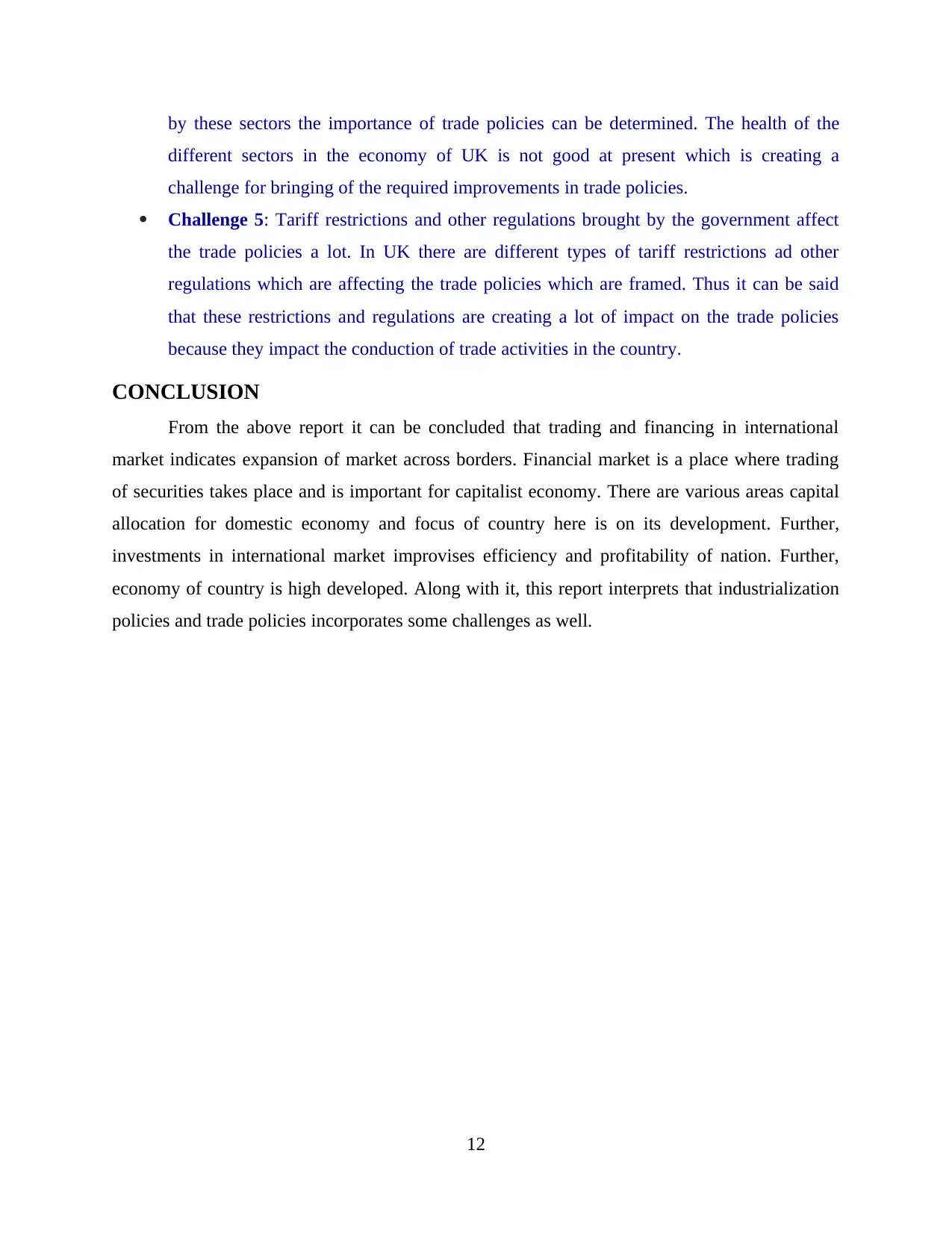
by these sectors the importance of trade policies can be determined. The health of the
different sectors in the economy of UK is not good at present which is creating a
challenge for bringing of the required improvements in trade policies.
Challenge 5: Tariff restrictions and other regulations brought by the government affect
the trade policies a lot. In UK there are different types of tariff restrictions ad other
regulations which are affecting the trade policies which are framed. Thus it can be said
that these restrictions and regulations are creating a lot of impact on the trade policies
because they impact the conduction of trade activities in the country.
CONCLUSION
From the above report it can be concluded that trading and financing in international
market indicates expansion of market across borders. Financial market is a place where trading
of securities takes place and is important for capitalist economy. There are various areas capital
allocation for domestic economy and focus of country here is on its development. Further,
investments in international market improvises efficiency and profitability of nation. Further,
economy of country is high developed. Along with it, this report interprets that industrialization
policies and trade policies incorporates some challenges as well.
12
different sectors in the economy of UK is not good at present which is creating a
challenge for bringing of the required improvements in trade policies.
Challenge 5: Tariff restrictions and other regulations brought by the government affect
the trade policies a lot. In UK there are different types of tariff restrictions ad other
regulations which are affecting the trade policies which are framed. Thus it can be said
that these restrictions and regulations are creating a lot of impact on the trade policies
because they impact the conduction of trade activities in the country.
CONCLUSION
From the above report it can be concluded that trading and financing in international
market indicates expansion of market across borders. Financial market is a place where trading
of securities takes place and is important for capitalist economy. There are various areas capital
allocation for domestic economy and focus of country here is on its development. Further,
investments in international market improvises efficiency and profitability of nation. Further,
economy of country is high developed. Along with it, this report interprets that industrialization
policies and trade policies incorporates some challenges as well.
12
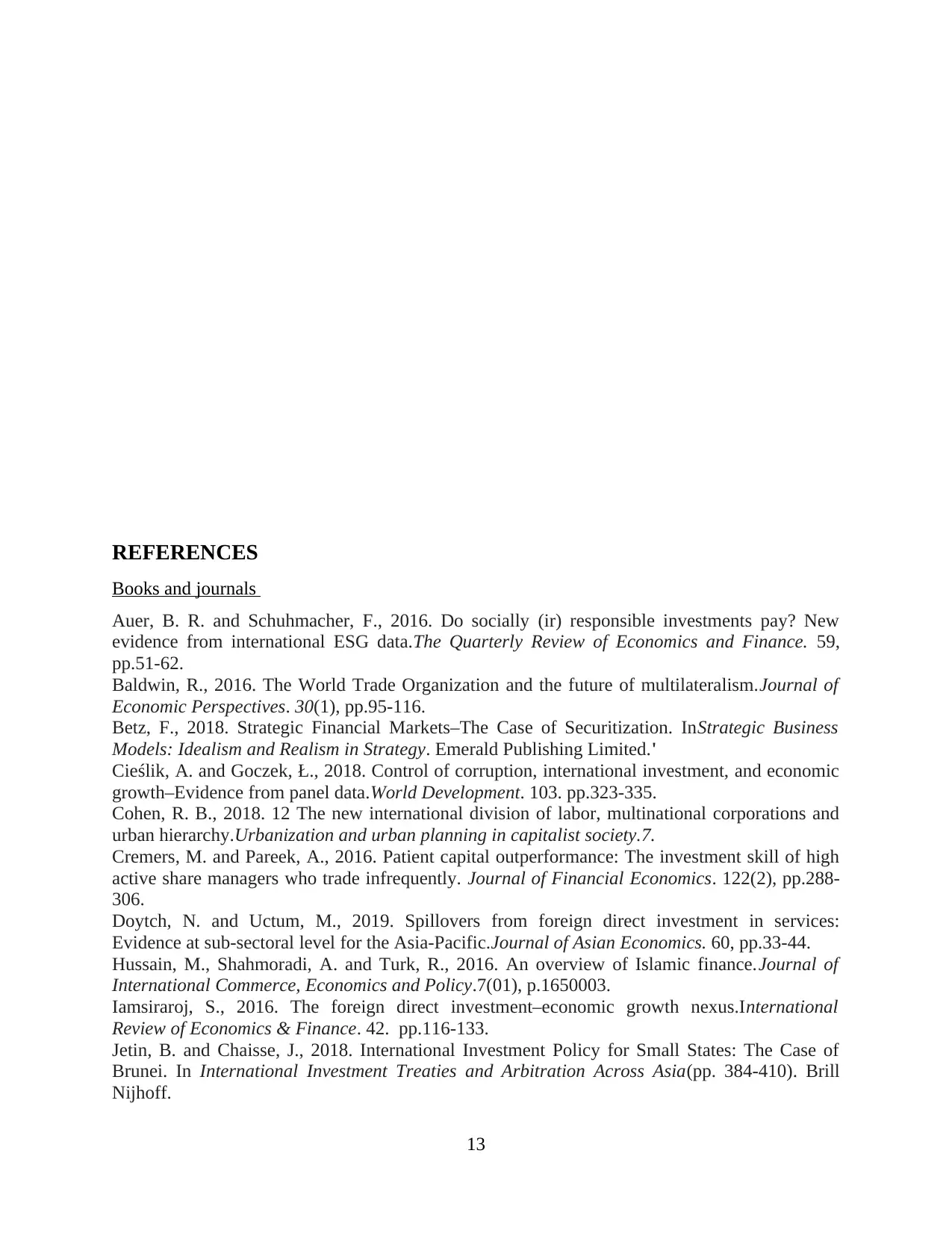
REFERENCES
Books and journals
Auer, B. R. and Schuhmacher, F., 2016. Do socially (ir) responsible investments pay? New
evidence from international ESG data.The Quarterly Review of Economics and Finance. 59,
pp.51-62.
Baldwin, R., 2016. The World Trade Organization and the future of multilateralism.Journal of
Economic Perspectives. 30(1), pp.95-116.
Betz, F., 2018. Strategic Financial Markets–The Case of Securitization. InStrategic Business
Models: Idealism and Realism in Strategy. Emerald Publishing Limited.'
Cieślik, A. and Goczek, Ł., 2018. Control of corruption, international investment, and economic
growth–Evidence from panel data.World Development. 103. pp.323-335.
Cohen, R. B., 2018. 12 The new international division of labor, multinational corporations and
urban hierarchy.Urbanization and urban planning in capitalist society.7.
Cremers, M. and Pareek, A., 2016. Patient capital outperformance: The investment skill of high
active share managers who trade infrequently. Journal of Financial Economics. 122(2), pp.288-
306.
Doytch, N. and Uctum, M., 2019. Spillovers from foreign direct investment in services:
Evidence at sub-sectoral level for the Asia-Pacific.Journal of Asian Economics. 60, pp.33-44.
Hussain, M., Shahmoradi, A. and Turk, R., 2016. An overview of Islamic finance.Journal of
International Commerce, Economics and Policy.7(01), p.1650003.
Iamsiraroj, S., 2016. The foreign direct investment–economic growth nexus.International
Review of Economics & Finance. 42. pp.116-133.
Jetin, B. and Chaisse, J., 2018. International Investment Policy for Small States: The Case of
Brunei. In International Investment Treaties and Arbitration Across Asia(pp. 384-410). Brill
Nijhoff.
13
Books and journals
Auer, B. R. and Schuhmacher, F., 2016. Do socially (ir) responsible investments pay? New
evidence from international ESG data.The Quarterly Review of Economics and Finance. 59,
pp.51-62.
Baldwin, R., 2016. The World Trade Organization and the future of multilateralism.Journal of
Economic Perspectives. 30(1), pp.95-116.
Betz, F., 2018. Strategic Financial Markets–The Case of Securitization. InStrategic Business
Models: Idealism and Realism in Strategy. Emerald Publishing Limited.'
Cieślik, A. and Goczek, Ł., 2018. Control of corruption, international investment, and economic
growth–Evidence from panel data.World Development. 103. pp.323-335.
Cohen, R. B., 2018. 12 The new international division of labor, multinational corporations and
urban hierarchy.Urbanization and urban planning in capitalist society.7.
Cremers, M. and Pareek, A., 2016. Patient capital outperformance: The investment skill of high
active share managers who trade infrequently. Journal of Financial Economics. 122(2), pp.288-
306.
Doytch, N. and Uctum, M., 2019. Spillovers from foreign direct investment in services:
Evidence at sub-sectoral level for the Asia-Pacific.Journal of Asian Economics. 60, pp.33-44.
Hussain, M., Shahmoradi, A. and Turk, R., 2016. An overview of Islamic finance.Journal of
International Commerce, Economics and Policy.7(01), p.1650003.
Iamsiraroj, S., 2016. The foreign direct investment–economic growth nexus.International
Review of Economics & Finance. 42. pp.116-133.
Jetin, B. and Chaisse, J., 2018. International Investment Policy for Small States: The Case of
Brunei. In International Investment Treaties and Arbitration Across Asia(pp. 384-410). Brill
Nijhoff.
13
Secure Best Marks with AI Grader
Need help grading? Try our AI Grader for instant feedback on your assignments.
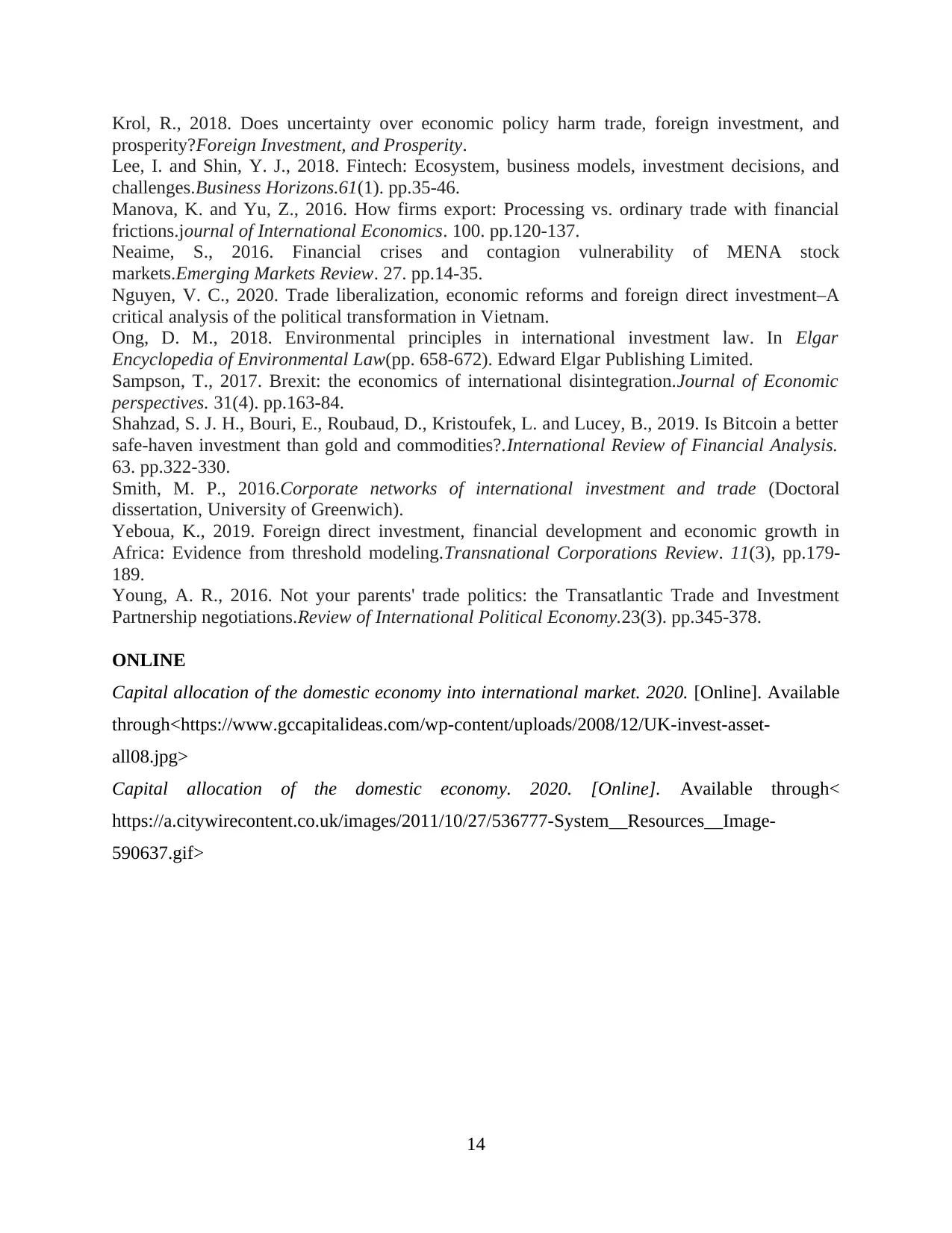
Krol, R., 2018. Does uncertainty over economic policy harm trade, foreign investment, and
prosperity?Foreign Investment, and Prosperity.
Lee, I. and Shin, Y. J., 2018. Fintech: Ecosystem, business models, investment decisions, and
challenges.Business Horizons.61(1). pp.35-46.
Manova, K. and Yu, Z., 2016. How firms export: Processing vs. ordinary trade with financial
frictions.journal of International Economics. 100. pp.120-137.
Neaime, S., 2016. Financial crises and contagion vulnerability of MENA stock
markets.Emerging Markets Review. 27. pp.14-35.
Nguyen, V. C., 2020. Trade liberalization, economic reforms and foreign direct investment–A
critical analysis of the political transformation in Vietnam.
Ong, D. M., 2018. Environmental principles in international investment law. In Elgar
Encyclopedia of Environmental Law(pp. 658-672). Edward Elgar Publishing Limited.
Sampson, T., 2017. Brexit: the economics of international disintegration.Journal of Economic
perspectives. 31(4). pp.163-84.
Shahzad, S. J. H., Bouri, E., Roubaud, D., Kristoufek, L. and Lucey, B., 2019. Is Bitcoin a better
safe-haven investment than gold and commodities?.International Review of Financial Analysis.
63. pp.322-330.
Smith, M. P., 2016.Corporate networks of international investment and trade (Doctoral
dissertation, University of Greenwich).
Yeboua, K., 2019. Foreign direct investment, financial development and economic growth in
Africa: Evidence from threshold modeling.Transnational Corporations Review. 11(3), pp.179-
189.
Young, A. R., 2016. Not your parents' trade politics: the Transatlantic Trade and Investment
Partnership negotiations.Review of International Political Economy.23(3). pp.345-378.
ONLINE
Capital allocation of the domestic economy into international market. 2020. [Online]. Available
through<https://www.gccapitalideas.com/wp-content/uploads/2008/12/UK-invest-asset-
all08.jpg>
Capital allocation of the domestic economy. 2020. [Online]. Available through<
https://a.citywirecontent.co.uk/images/2011/10/27/536777-System__Resources__Image-
590637.gif>
14
prosperity?Foreign Investment, and Prosperity.
Lee, I. and Shin, Y. J., 2018. Fintech: Ecosystem, business models, investment decisions, and
challenges.Business Horizons.61(1). pp.35-46.
Manova, K. and Yu, Z., 2016. How firms export: Processing vs. ordinary trade with financial
frictions.journal of International Economics. 100. pp.120-137.
Neaime, S., 2016. Financial crises and contagion vulnerability of MENA stock
markets.Emerging Markets Review. 27. pp.14-35.
Nguyen, V. C., 2020. Trade liberalization, economic reforms and foreign direct investment–A
critical analysis of the political transformation in Vietnam.
Ong, D. M., 2018. Environmental principles in international investment law. In Elgar
Encyclopedia of Environmental Law(pp. 658-672). Edward Elgar Publishing Limited.
Sampson, T., 2017. Brexit: the economics of international disintegration.Journal of Economic
perspectives. 31(4). pp.163-84.
Shahzad, S. J. H., Bouri, E., Roubaud, D., Kristoufek, L. and Lucey, B., 2019. Is Bitcoin a better
safe-haven investment than gold and commodities?.International Review of Financial Analysis.
63. pp.322-330.
Smith, M. P., 2016.Corporate networks of international investment and trade (Doctoral
dissertation, University of Greenwich).
Yeboua, K., 2019. Foreign direct investment, financial development and economic growth in
Africa: Evidence from threshold modeling.Transnational Corporations Review. 11(3), pp.179-
189.
Young, A. R., 2016. Not your parents' trade politics: the Transatlantic Trade and Investment
Partnership negotiations.Review of International Political Economy.23(3). pp.345-378.
ONLINE
Capital allocation of the domestic economy into international market. 2020. [Online]. Available
through<https://www.gccapitalideas.com/wp-content/uploads/2008/12/UK-invest-asset-
all08.jpg>
Capital allocation of the domestic economy. 2020. [Online]. Available through<
https://a.citywirecontent.co.uk/images/2011/10/27/536777-System__Resources__Image-
590637.gif>
14
1 out of 17
Related Documents
Your All-in-One AI-Powered Toolkit for Academic Success.
+13062052269
info@desklib.com
Available 24*7 on WhatsApp / Email
![[object Object]](/_next/static/media/star-bottom.7253800d.svg)
Unlock your academic potential
© 2024 | Zucol Services PVT LTD | All rights reserved.




